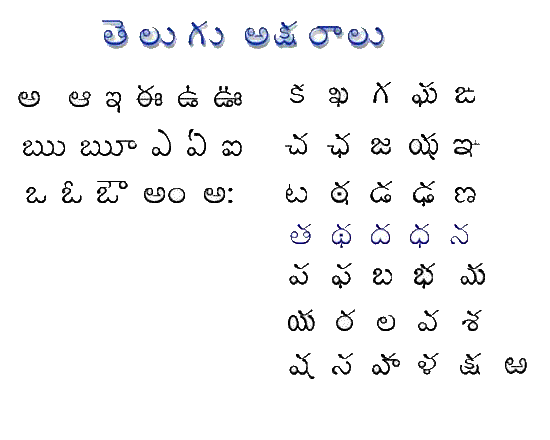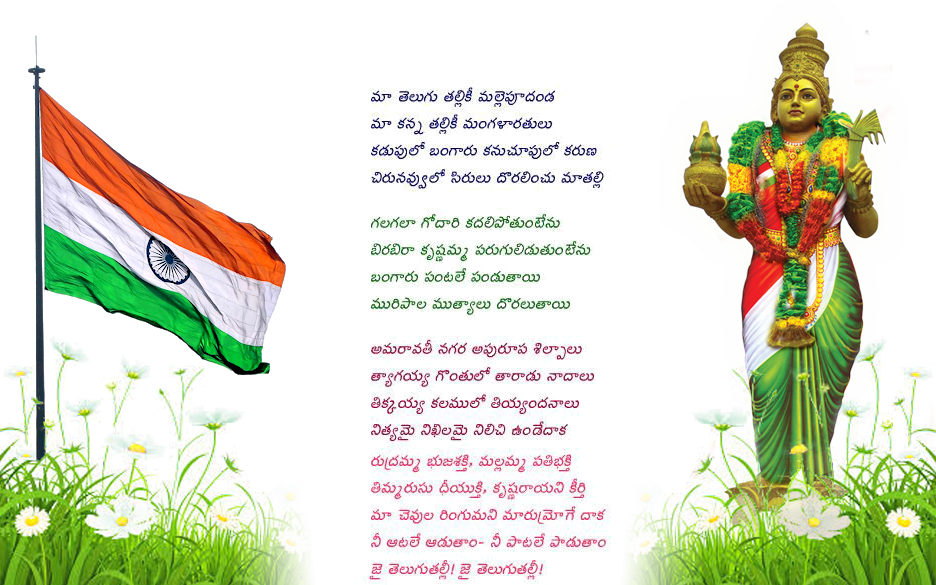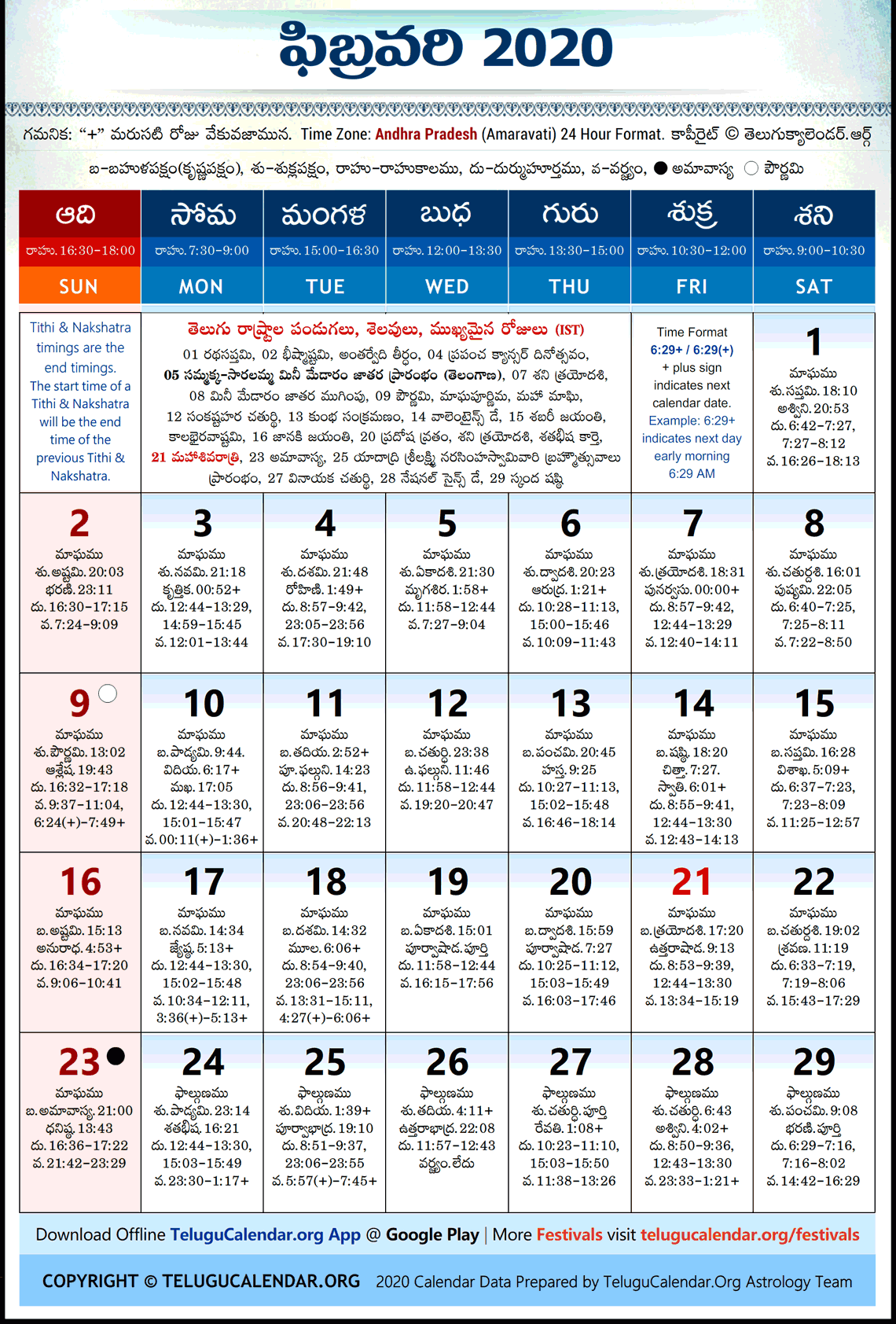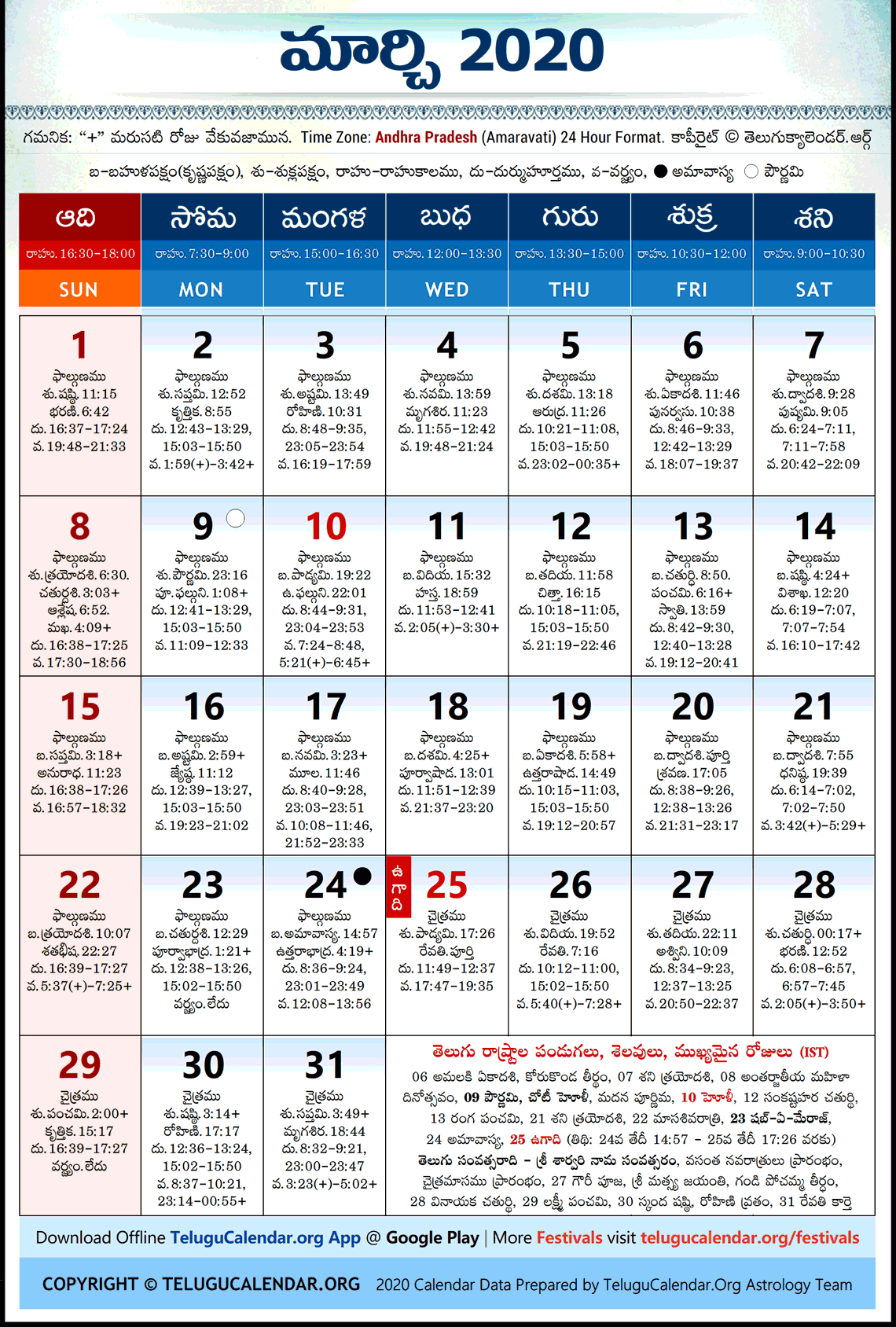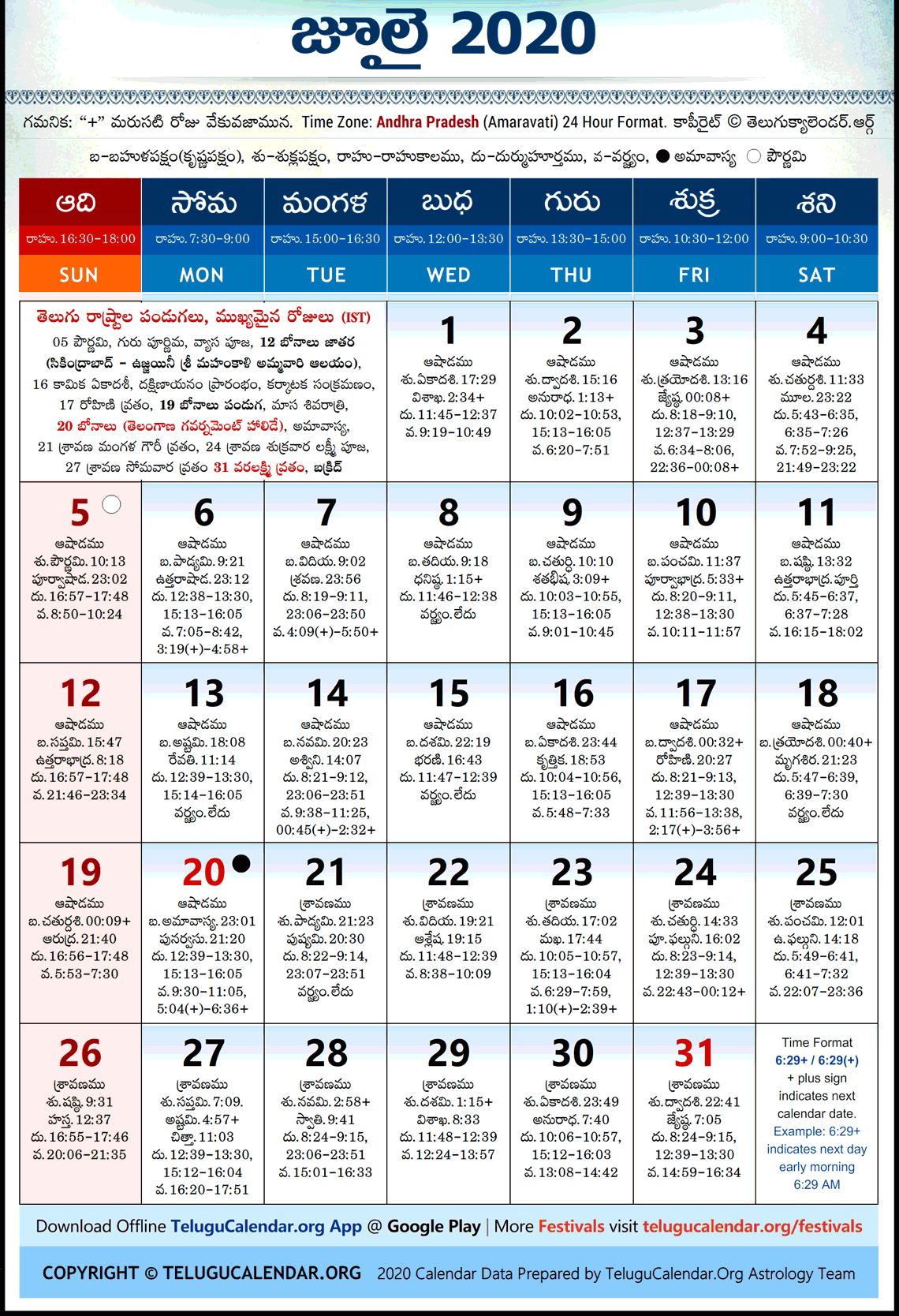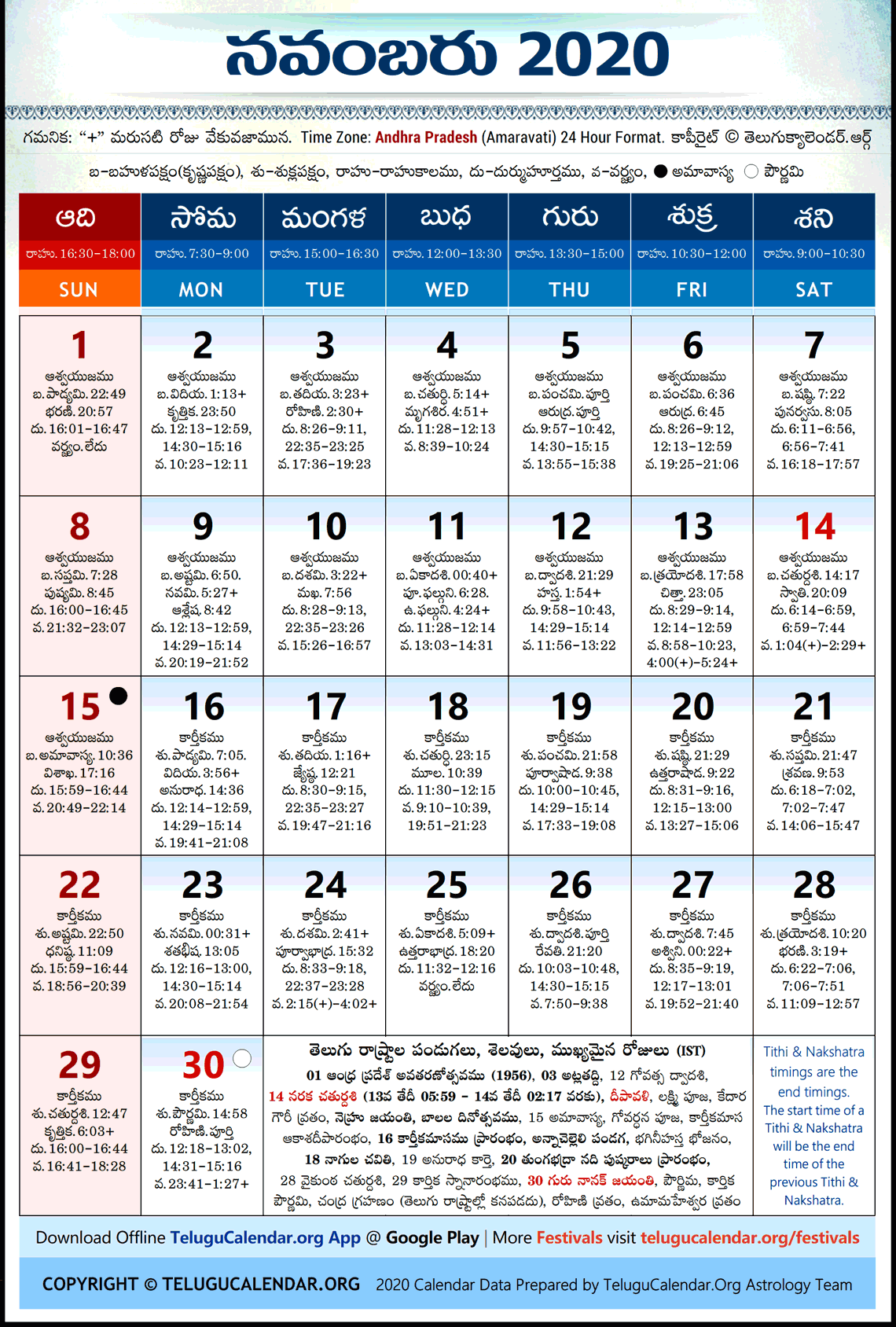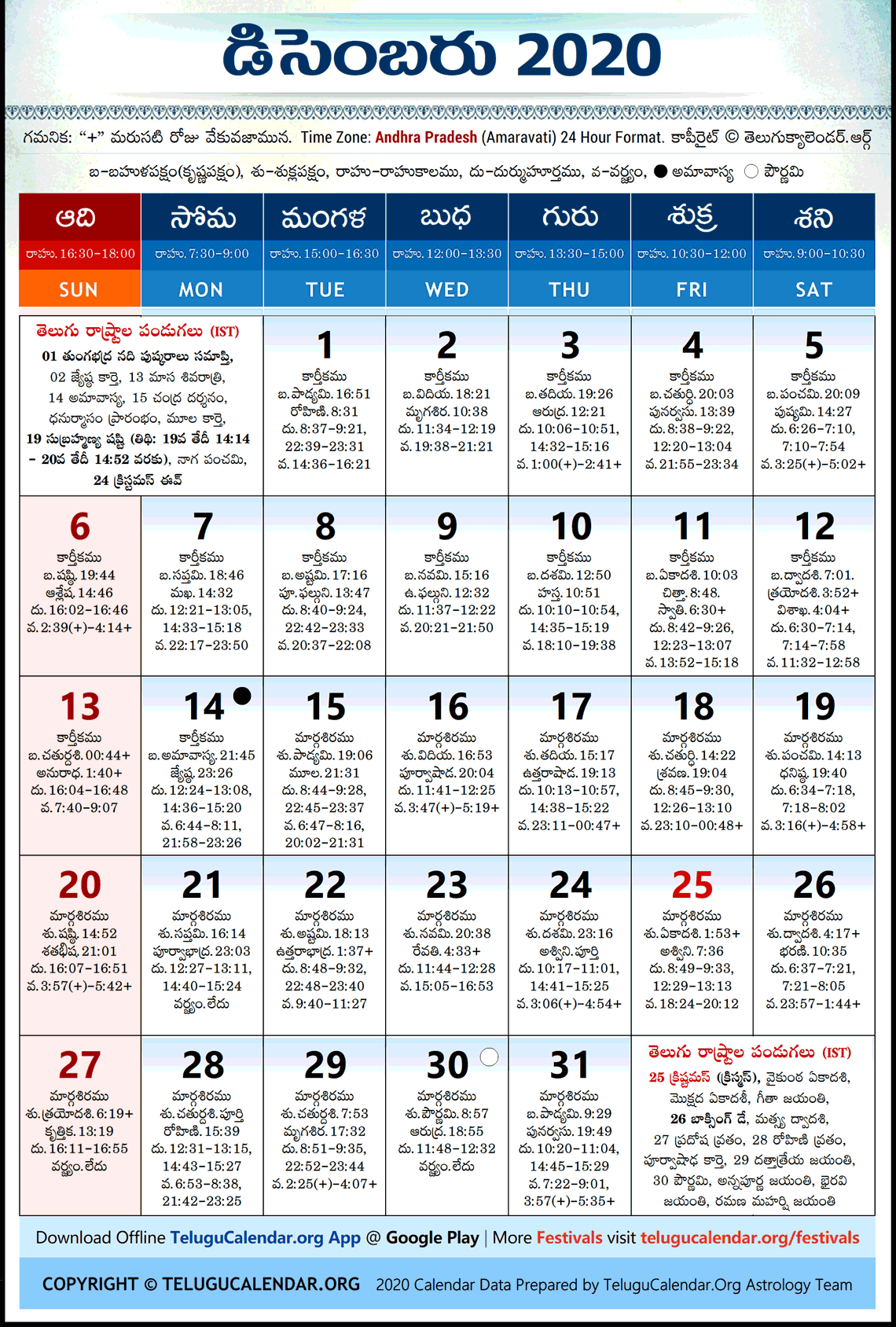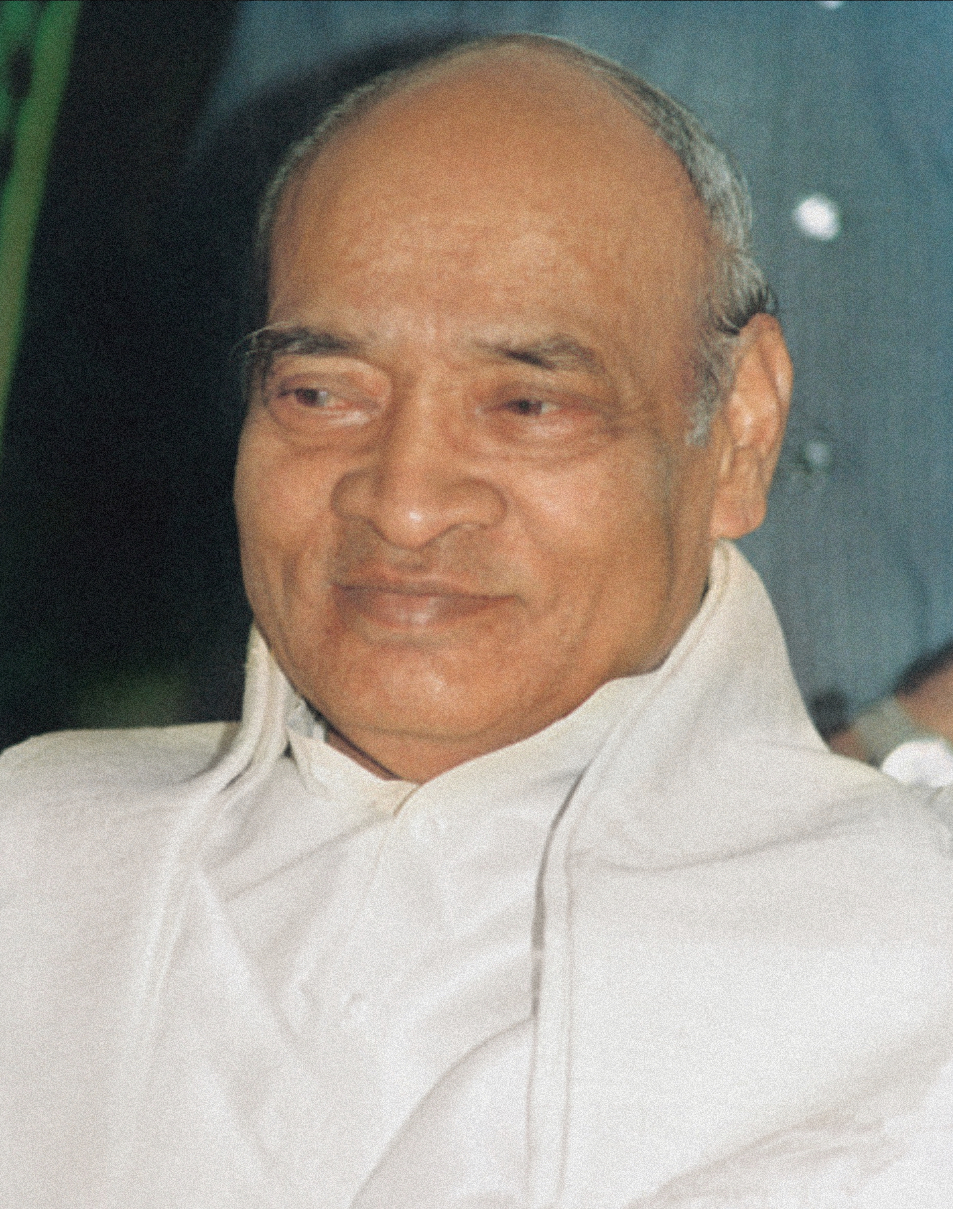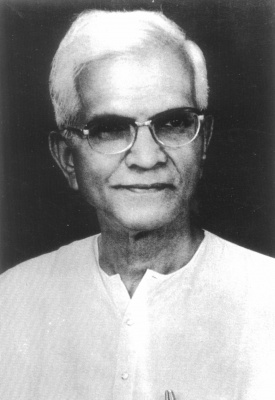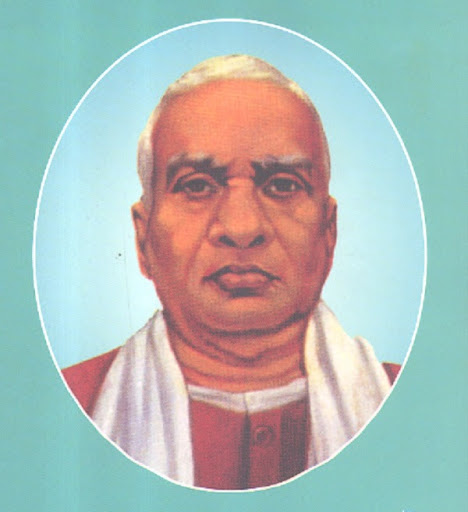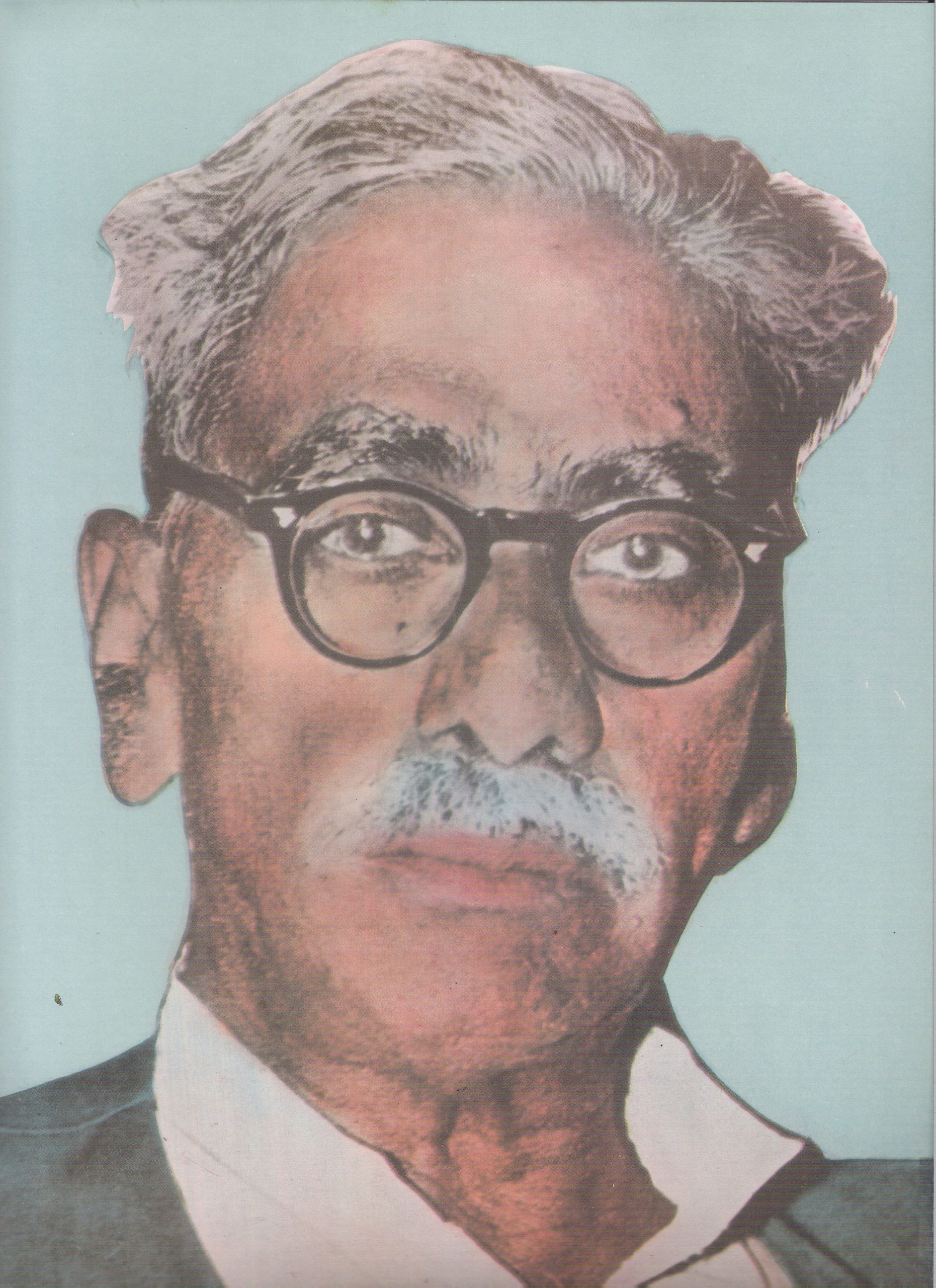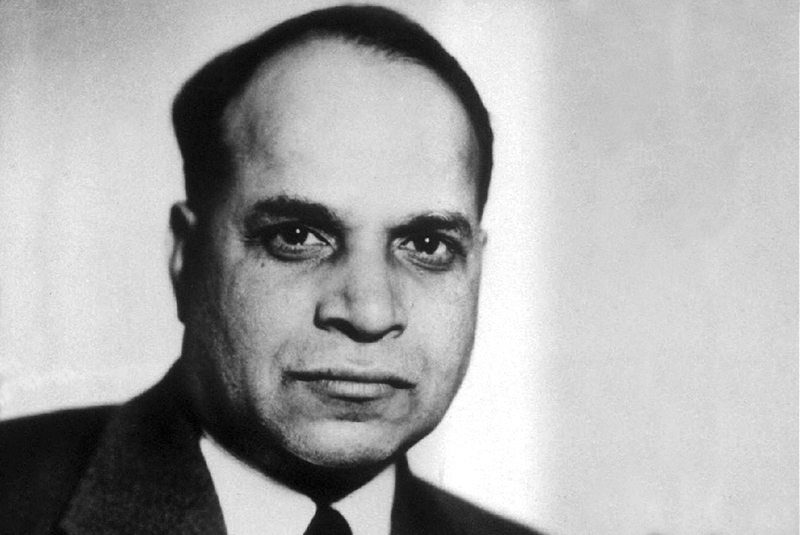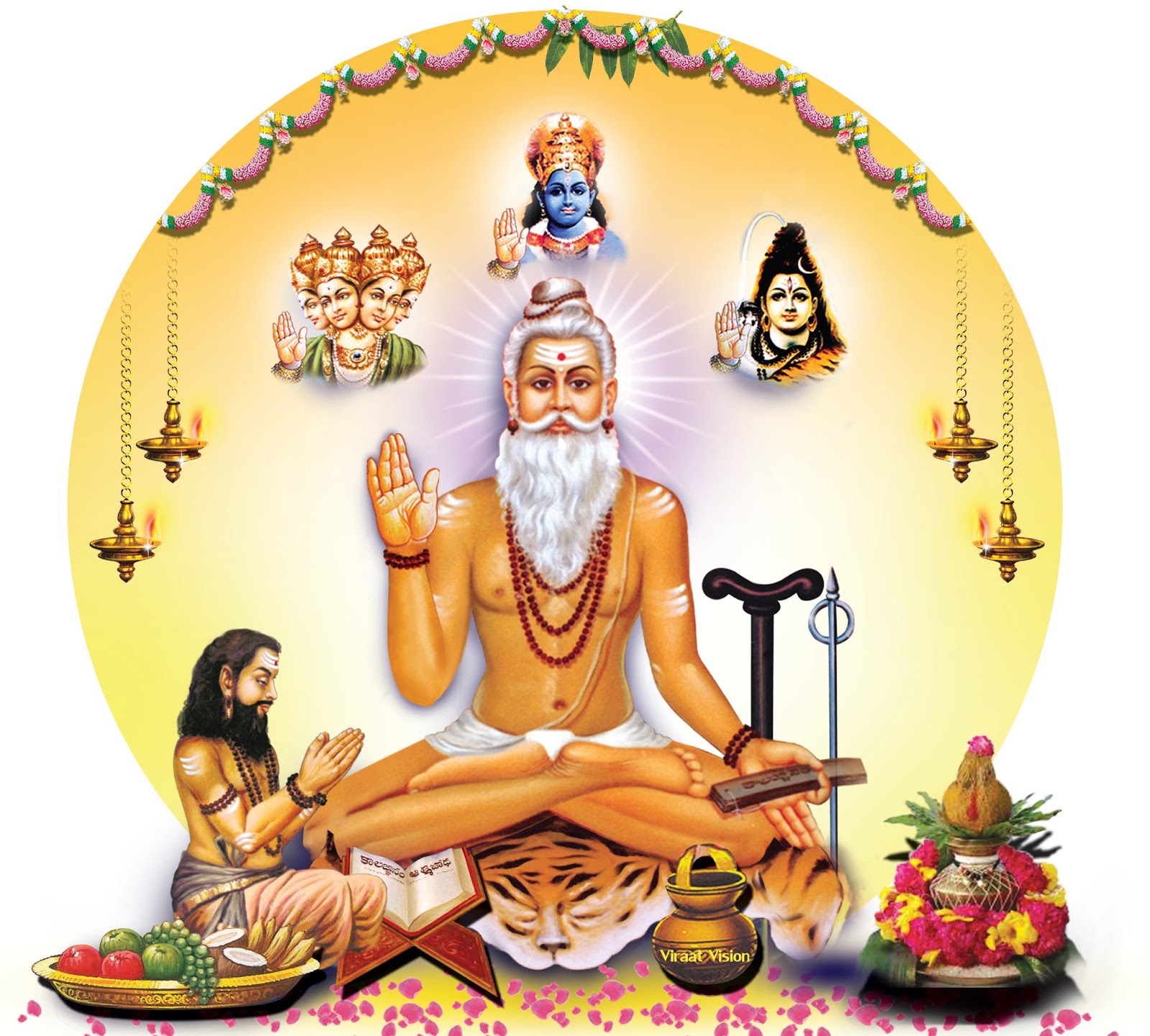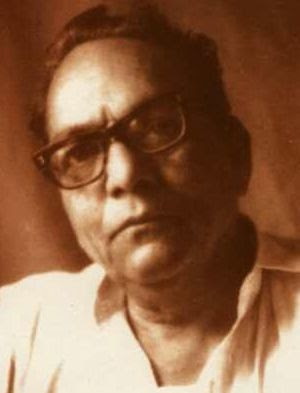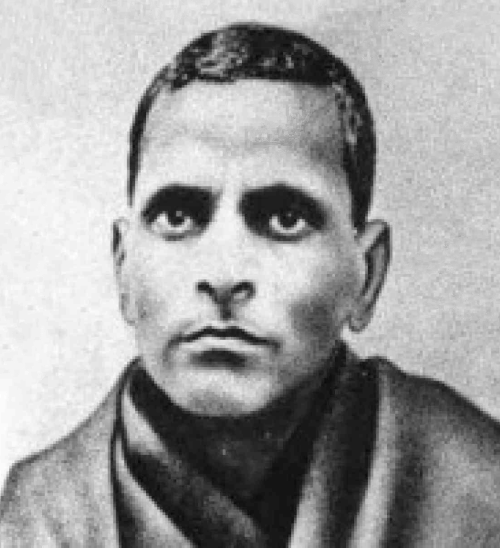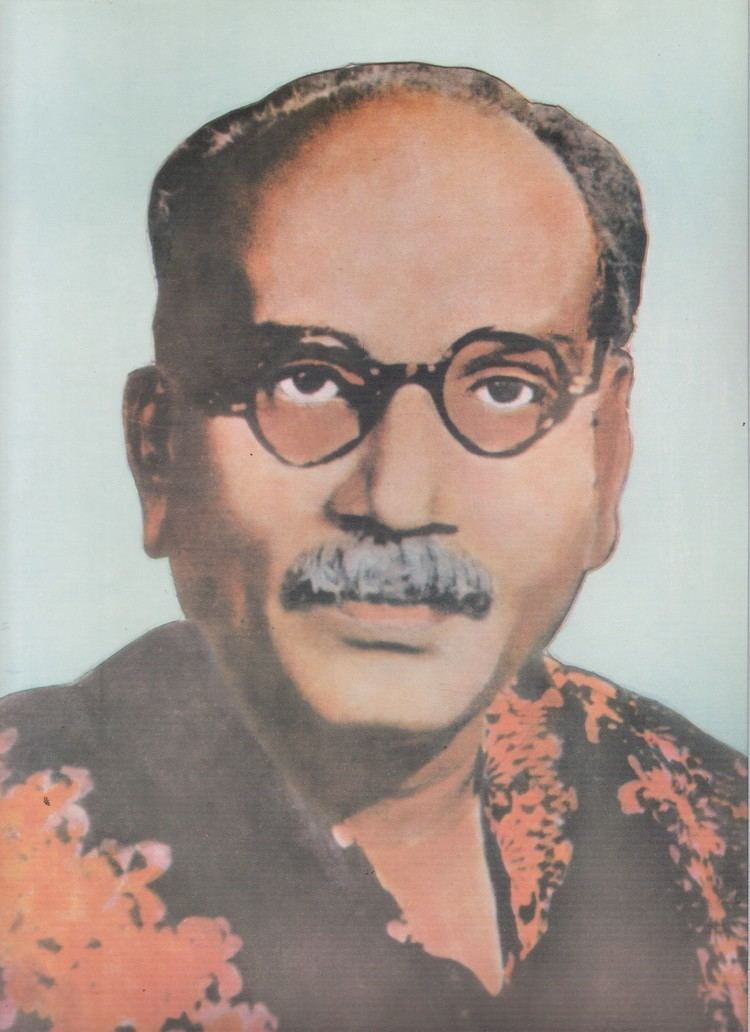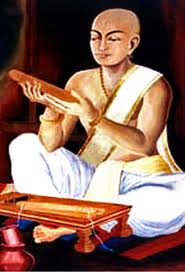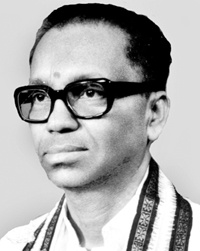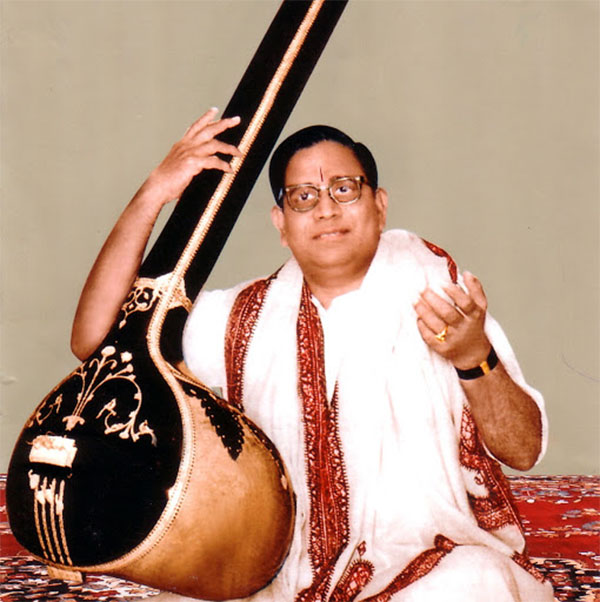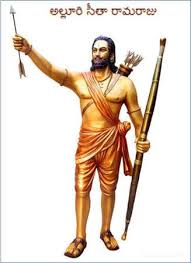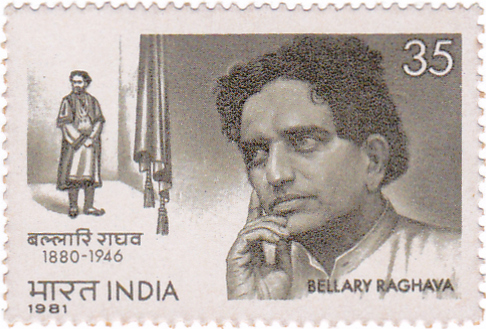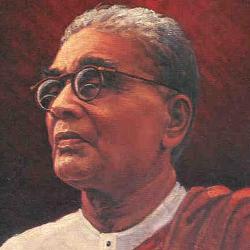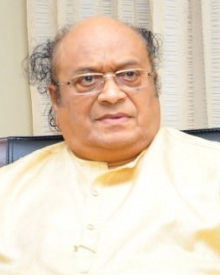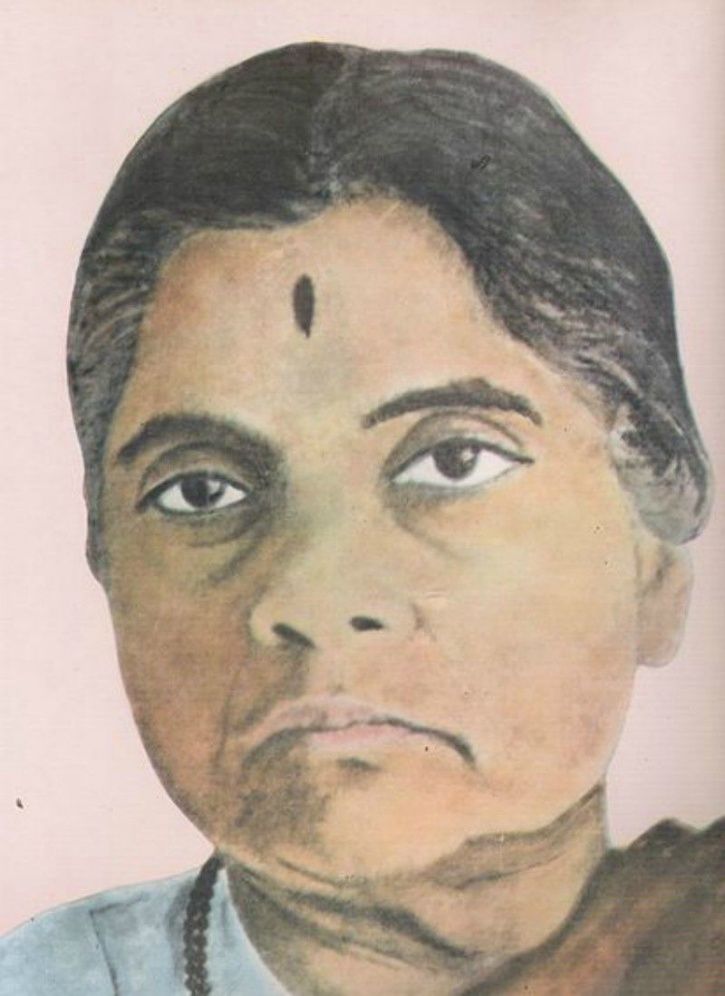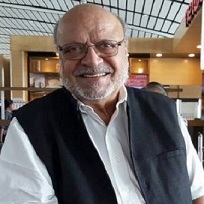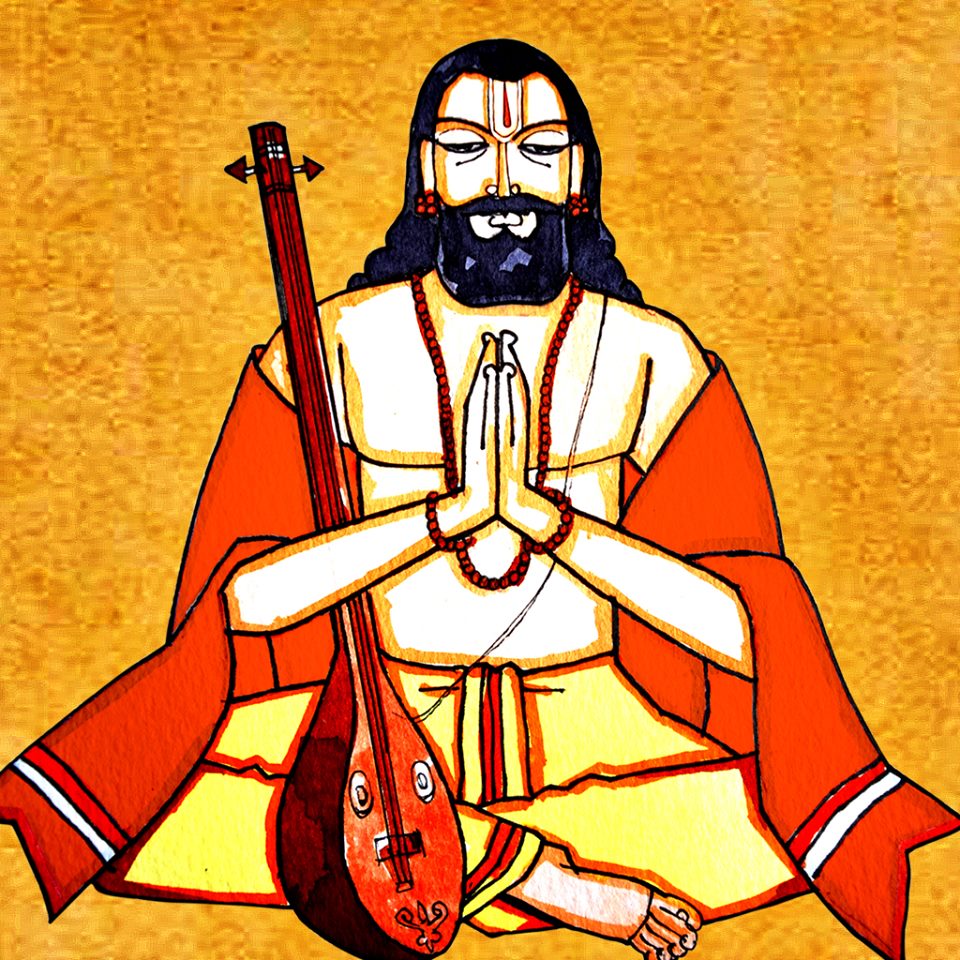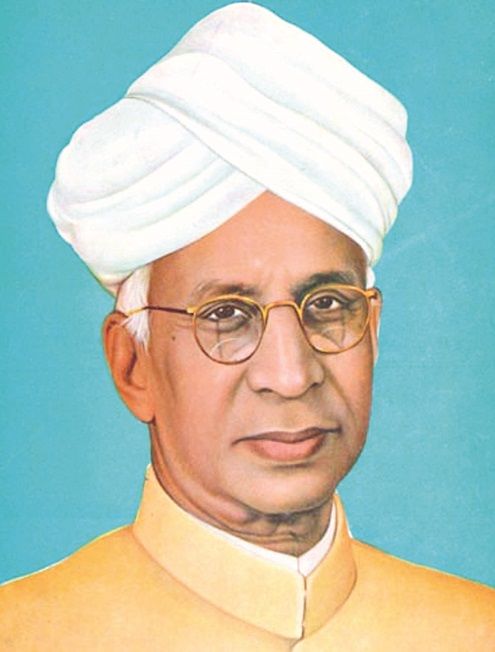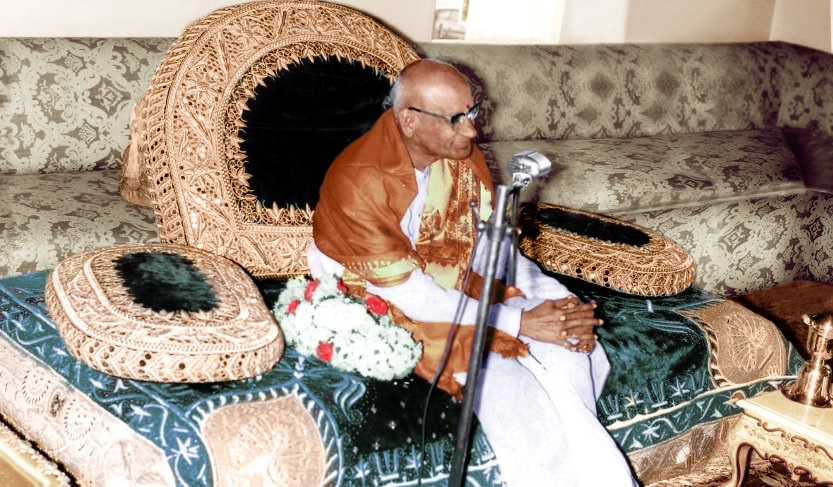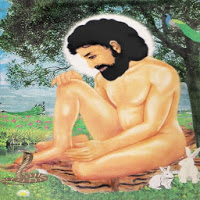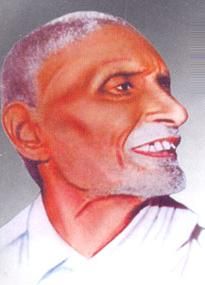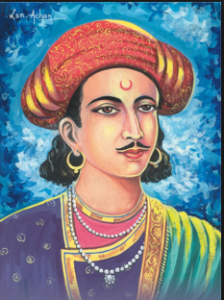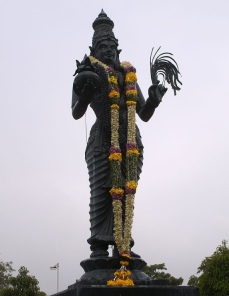
The most popular explanation that is given to the word telugu is that it comes from the word trilinga, i.e. from the three temples at Srisailam, Drakasharamam, and Kaleshwaram. However, not many scholars accept this view. Let us examine some of them here.
Khandavalli Lakshmi Ranjanam
It probably comes from the word talaing. Since tala refers to head, talaings refers to leaders. Probably, talaings were civilized people and conquered the tribals in the area of current Andhra pradesh. Hence the name talaings. Later this must have given rise to the words telungu and trilinga.
Godavarti Ramadasu
Some say that the word telugu comes from the Sanskrit forms trilinga or trikalinga: Actually, the word kalinga itself is a Dravidian word. In Kui language, rice is called Kulinga. Since Kuis were mainly rice eaters, Aryans might have called them kulingas or kalingas.
Marepalli Ramachandra Shastri
In Gondi languahge, unga is form for plural. telu means white. Hence, telunga probably refers to people who are white in complexion.
Ganti Jogi Somayaji
ten refers to south in Proto-Dravidian. Hence tenungu refers to Southerners.
But all of our south indian languages are derived from a common language called “DRAVIDA”, but luckily telugu is the sweetest language out of them. That way people say it “italian of the east”( ref: sir C.P.Brown).Telugu literature was started in 11th century by the great person named ” NANNAYYA”. He was the first person who gave life to our telugu literature first time. He put his efforts to write “MAHABHARATHAM” in telugu. Before that there is no single telugu literature. So we can say telugu literature stated in 11th century.
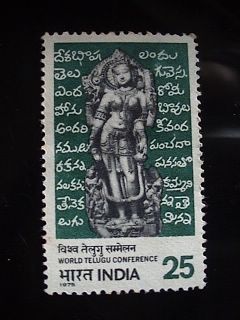
Which of the two words is older? telugu or tenugu ? Some say that tenugu is older than telugu because Nannaya used the word tenugu and Ketana who is younger than Nannaya used the word telugu in his Andhra Bhaashaa Bhushanam. Malliya Raechana wrote a grammar book (Lakshana Granthamu) called Kavi Janaashrayamu. But he didn’t use this word in the place of ‘praasa’ anywhere, so we are not sure what he really used.
The popular notion is that the first person to use the word trilinga is Vidyanaatha in Kakatiya era. Actually, the first person to use the word trilinga is Rajashekhara in Vidhdhasaala Bhanjika. He is the first person to use trilinga with a ra vattu . Markandeya and Vayu Puranas mention only tilinga. One of the oldest works in Tamil called Agattiyam says Konganam Kannadam Kollam telungam . On the whole, it is more probable that the word telugu is older than the word tenugu
Telugu Word and Meaning in English

First Relations
- Amma Mother
- Agrajudu Eldest Brother
- Akka Elder Sister
- Akkai Elder Sister
- Akkayya Elder Sister
- Ammaayi Daughter
- Anna Elder Brother
- Annaai Elder Brother
- Annayya Elder Brother
- Avida Wife
- Bhaarya Wife
- Bhartha Husband
- Chelli Younger Sister
- Chellelu Younger Sister
- Koothuru Daughter
- Mogudu Husband
- Naanna Father
- Pellaam Wife
- Putrika Daughter
- Puthrudu Son
- Sodhari Sister
- Sodharudu Brother
- Sahodhari Sister
- Sahodharudu Brother
- Sreemathi Wife
- Sreevaru Husband
- Thalli Mother
- Thammudu Younger Brother
- Thandri Father
- Vaaru Husband
Second Relations
- Aamma Mother's Elder Sister. Father's elder Sister-in-law
- Aayya Father's elder brother. Mother's elder Brother-in-law
- Ammamma Grand Mother (Mother's mother)
- Attha Aunt.
- Atthagaru Wife's mother, Husband's mother
- Baabaai Father's younger brother, Mother's younger Brother-in-law
- Baava Sister's Husband. Wife's Brother
- Chinnanna Father's younger brother, Mother's younger brother-in-law
- Chinnamma Mother's younger sister, Father's younger sister-in-law
- Jejaiah Grand father (Father's father)
- Jejamma Grand mother (Father's mother)
- Jeji Naanna Grand father (Father's father)
- Maamagaru Wife's father, Husband's father
- Maamayya Uncle
- Maradalu Younger brother's wife. Sister-in-law(Younger), Wifes younger sister.
- Maridi Husbands younger brother.
- Menamaama Mother's brother, Meternal uncle
- Menattha Father's sister
- Naanamma Father's mother
- Naayanamma Father's mother
- Pedanaanna Father's elder brother, Mother's elder brother-in-law
- Peddamma Mother's elder sister, Father's elder sister-in-law
- Pinni Mother's younger sister, Father's younger sister-in-law
- Thaatha Grand Father (Mother's father or Father's father).
- Thaathaiah Grand Father (Mother's father or Father's father)
- Vadina Elder brother's wife. Sister-in-law (elder). Wife's elder sister.
Third Relations
- Mutthatha Great grand father, Grand father's father, Grand mother's father, Father's grand father
- Thaathamma Great grand mother, Grand mother's mother, Grand father's mother, Mother's grand mother.
Sakamulu(2)
Saalivaahana Sakamu
Vikramaarka Sakamu.
Kaalamulu (3 Seasons)
Vaesavi Kaalamu (Summer)
Varshaa Kaalamu or Vaanaa Kalamu (Rainy Season)
Chali Kaalamu (Winter)
Trimoorthulu(3)
Brahma (Creator)
Vishnu (Protector)
Maheswarudu/Rudhrudu (Destroyer).
Triloakamulu(3)
Swargamu
Marthyaloakamu
Paathaalamu.
Trikaalamulu(3)
Bhoothamu (Past)
Bhavishyaththu (Future)
Varthamaanamu (Present).
Trikaranamulu (3)
Manasa (Manassu)
Vaacha (Vaakku)
Karmana (Pani).
Trigunamulu(3)
Satva
Rajo
Tamo.
Trimataacharyulu(3)
Sankara
Raamaanuja
Maadhava.
Purushaardhamulu(4)
Dharma
Ardha
Kaama
Moaksha.
Chaturvaedamulu(4)
Rug
Yajur
Saama
Adharvana.
Vayoavasthalu(4)
Baalyamu (Childhood)
Yavvanamu (Teenage)
Kaumaaramu (Middle age)
Vaarthakyamu (Old age).
Chaturaasramamulu(4)
Brahmacharyamu
Gaarhastyamu(Gruhasthamu)
Vaanaprasthamu
Sanyaasamu.
Panchabhoothamulu(5)
Bhoomi (Earth)
Neeru (Water)
Taejassu (Light)
Vaayuvu (Air)
Aakaasamu (Sky).
Yugamulu(4)
Kruta Yugamu (17,28,000 years)
Traetaa Yugamu (12,96,000 years)
Dwaapara Yugamu (8,64,000 years)
Kali Yugamu (4,32,000 years)
Panchakaavyamulu(5)
Raghuvamsamu
Kumaara Sambhavamu
Maegha Sandaesamu
Bhaaravi
Maaghamu.
Pancha Gangalu(5 rivers)
Ganga
Krishna
Godavari
Tungabhadra
Kaveri.
Panchaamrutamulu(5)
Neeru (Water)
Paalu (Milk)
Perugu (Curd)
Neyyi (Ghee)
Thaene (Honey).
Panchaangamulu(5)
Thidhi
Vaaramu
Nakshathramu
Yogamu
Karanamu
Rutuvulu (6 Seasons)
Vasantha
Greeshma
Varsha
Haemantha
Sarath
Sisira.
Shadrasamulu (6 tastes)
Uppu
Pulupu
Kaaramu
Theepi
Chaedu
Vagaru.
Shadchakravartulu (6 kings)
Harischandhrudu
Naludu
Purukutsudu
Purooravudu
Sagarudu
Kaarta Veeryaarjunudu.
Vaaramulu (7-Days of the week)
Aadhi Vaaramu = Sunday
Soma Vaaramu = Monday (‘So’as in Soldier)
Mangala Vaaramu = Tuesday
Budha Vaaramu = Wednesday
Guru Vaaramu = Thursday
Sukra Vaaramu = Friday
Seni Vaaramu = Saturday (‘Se’ as in set)
Sapta Mahaa Rushulu(7 Great Saints)
Kasyapudu
Atri
Bharadwaajudu
Viswaamitrudu
Gouthamudu
Vasishtudu
Jamadagni.
Sapta Samudramulu(7 Seas)
Lavana Samudramu
Ikshu Samudramu
Sura Samudramu
Sarpi Samudramu
Dadhi Samudramu
Ksheera Samudramu
Jala Samudramu
Sapta Loakamulu(7 Upper Worlds)
Harischandhrudu
Bhoolokamu
Bhuvarlokamu
Suvarlokamu
Maharlokamu
Janarlokamu
Tapolokamu
Satyalokamu
Sapta Loakamulu(7 Lower Worlds)
Atalamu
Vitalamu
Sutalamu
Talaatalamu
Mahaatalamu
Rasaatalamu
Paataalamu.
Ashtaavadhaanamulu(8 Skills)
Chaturangamu (Chess)
Kavitvamu (Poetry)
Vraayuta (Writing)
Chaduvuta (Reading)
Ganitamu (Mathematics)
Sangeetamu (Music)
Yukti Chepputa (Questioning)
Vyasthaakshari.
Dhikkulu(8-Directions)
- Thoorpu = East
- Padamara = West
- Uttharamu = North
- Dakshinamu = South
- Aagnaeyamu = South-East
- Nairuthi = South-West
- Vaayuvyamu = North-West
- Eesanyamu = North-East (‘Sa’ as in Sat)
Ashta Dikpaalakulu(8)
Indhrudu
Agni
Yamudu
Nibuthi
Varunudu
Vaayuvu
Kubaerudu
Eesanudu
Ashta Lakshmulu(8)
Dhana Lakshmi
Dhaanya Lakshmi
Vijaya Lakshmi / Jaya Lakshmi
Dhairya Lakshmi
Santhaana Lakshmi
Gaja Lakshmi
Aadhi Lakshmi
Vidyaa Lakshmi
Nava Brahmalu(9 Creators)
Mareechi
Bharadwajudu
Angeerasudu
Pulasthyudu
Pulahudu
Kratuvu
Dakshudu
Vasishstudu
Vaasudevudu.
Sangeetamu (Music)
Yukti Chepputa (Questioning)
Vyasthaakshari.
Nava Rasamulu(9 Poses)
Srungaaramu (Romance)
Haasyamu (Humour)
Karunamu (Kindness, Pity)
Roudramu (Anger)
Veeramu (Heroism)
Bhayaanakamu (Threatening)
Bheebhatsamu (Destruction)
Adhbhutamu (Wonder)
Saantamu (Peace)
(Saan as in sandwitch).
Nava Dweepaalu(9 Islands)
Indhra dweepam.
Swaetha dweepam.
Thaamravarni dweepam.
Gabhasthi dweepam.
Naagara dweepam.
Soumya dweepam.
Gaandharva dweepam.
Vaarunaa dweepam.
Jamboo dweepam.
Vaayuvu
Kubaerudu
Eesanudu
Nava Ratnamulu(9 Precious Stones)
Vajramu
Vaidooryamu
Gomedhikamu
Pushya Raagamu
Marakathamu
Maanikyamu
Neelamu
Pravaalamu
Mutyamu.
Gaja Lakshmi
Aadhi Lakshmi
Vidyaa Lakshmi
Telugu Raasulu(12 Zodiac Signs)
Maeshamu – Maeka – Aries.
Vrushabhamu – Yeddhu – Taurus.
Mithunamu – Dampathulu – Gemini.
Karkaatakamu – Endrakaaya – Cancer.
Simhamu – Singamu – Leo.
Kanya – Paduchu – Virgo.
Tula – Traasu – Libra.
Vruchchikamu – Thaelu – Scorpio.
Dhanussu – Villu – Sagittarius.
Makaramu – Mosali – Capricorn.
Kumbhamu – Kadava – Aquarius.
Meenamu – Chaepa – Pisces.
Nelalu(12-Months)
Chaitramu = March-April
Vaisaakhamu = April-May
Jyaestamu = May-June
Aashaadamu = June-July
Sraavanamu = July-August
Bhaadrapadamu = August-September
Aaswayujamu = September-October
Kaartheekamu = October-November
Maargasiramu = November-December
Pushyamu = December-January
Maaghamu = January-February
Phaalgunamu = February-March.
Astaadasa Puraanaalu(18)
Matsya Puraanam.
Maarkaandaeya Puraanam.
Bhaagavata Puraanam.
Bhavishyaththu Puraanam.
Bramhaanda Puraanam.
Bramha Vaivartha Puraanam.
Bramha Puraanam.
Vaamana Puraanam.
Vaayu Puraanam.
Vishnu Puraanam.
Varaaha Puraanam.
Agni Puraanam.
Naarada Puraanam.
Padma Puraanam.
Linga Puraanam.
Garuda Puraanam.
Koorma Puraanam.
Scaanda Puraanam.
Nava Dhaanyamulu (9 grains)
Vadlu Minumulu Anumulu
Ulavalu Nuvvulu Kandulu
Pesalu Godhumalu Senagalu.
Telugu Mahaa Kavulu(18 Great poets)
Nannaya Bhattu.
Tikkana Somayaaji.
Errapraggada.
Paalkuriki Somana.
Vemulavaada Bheemakavi.
Bhaskarudu.
Ranganathudu.
Srinadhudu.
Bammera Pothana.
Vemana.
Tallapaka Annamacharyudu.
Sri Krishna Deva Rayalu.
Ashta Diggaja Kavulu
(i) Allasaani Peddana
(ii) Nandi Timmana
(iii) Maadayagari Mallana
(iv) Dhoorjati
(v) Ayyala Raaju Raama Bhadrudu
(vi) Pingali Soorana
(vii) Raamaanujabhushana and
(viii) Tenali Rama Krishna.
Molla.
Tarigonda Venkamma.
Thyagaraju.
Chinnaya Soori.
Kandukuri Veeresalingam Pantulu
Telugu Numbers (Ankelu)
1 = Okati
2 = Rendu
3 = Moodu
4 = Naalugu
5 = Aidhu
6 = Aaru
7 = Aedu
8 = Enimidhi
9 = Thommidhi
10 = Padhi
11 = Padhakondu
12 = Pannendu
13 = Padhamoodu
14 = Padhunaalugu
15 = Padhihaenu
16 = Padhahaaru
17 = Padhihaedu
18 = Paddhenimidhi
19 = Panthommidhi
20 = Iravai
30 = Muppai
40 = Nalabai
50 = Yaabai
60 = Aravai
70 = Debbai
80 = Yenabai
90 = Thombai
100 = Nooru or Vandha
200 = Rendu Vandalu
1000 = Veyyi
10,000 = Padhi Vaelu
1,00,000 = Laksha
10,00,000 = Padhi Lakshalu
1,00,00,000 = Koti
(Ko as in ‘Co’bra and ti as in ‘ti’mid)
Telugu Nakshatraalu(27 Stars)
Aswini
Bharani
Krithika
Rohini
Mrugasira
Aarthra
Punarvasu
Pushyami
Ashlesha
Makha
Pubba
Uttara
Hastha
Chitta
Swathi
Visakha
Anuradha
Jyeshta
Moola
Poorvaashada
Uttaraashada
Shravana
Dhanishta
Satabhisha
Poorvabhadra
Uttarabhadra and
Revathi
The cultural heritage of Andhra Pradesh is rich with classical and folk arts ranging from the ballad singing ‘Burrakatha’ to the refined classical form of ‘Kuchipudi’ dance. As the home of abundant folk tradition, Andhra Pradesh has more than sixty classical and folk dance forms. A few of the popular performing arts are:


Kuchipudi Dance
Kuchipudi, one of the famous classical dances in India takes its name from a village, Kuchelapuram, 60km away from Vijayawada. This dance drama enactment throbs with Telugu lyrics and Sanskrit verses. It is distinguished from other dance forms by narrative interruptions that makes it very popular and expressive. This art form emphasizes on animation. Apart from that it is akin to ‘Bharathanatyam’. The present style of Kuchipudi and its developemet are accredited to ‘Siddhendra Yogi’ and ‘Tirtha Narayana’.
Andhra Natyam
The traditional dance form of ‘Andhra Natyam’ originated as a temple dance that dates back to as early as 2000 years. The dance form was categorized as ‘Agma Nartana’ performed in the temples, ‘Carnatakam’ performed in the royal courts, and ‘Darbari Attam’ performed in the courtyards of temples for the common man. Andhra Natyam is similar in style to Bharatanatyam and is based on Nandikesa’s ‘Abhinaya Darpana’ and Bharata’s ‘Natya Shastra’. This was the female tradition (Lasya) of dance that was characterized by a rich display of foot work and superior ‘abhinaya’. Unlike the original version, the present Andhra Natyam is performed with stylish costumes, makeup, ornaments and orchestra.

Perini Thandavam
‘Perini Thandavam’ is a vigorous male dance form flourished during the Kakatiyas of Warangal. The warriors enacted the dance in front of the idol of ‘Lord Siva’ before they left for the battlefield. The dance is done to the resounding beats of drums. The dancers invoke and invite Siva offering their bodies to him to dance through. Perini almost disappeared after the decline of Kakatiya dynasty. Dr. Nataraja Ramakrishna revived the dance form to the present day status.
Tappetta Gullu
It is a folk dance in narrative form that combines devotion with entertainment. ‘Tappatta Gallu’ is confined to Visakapatnam, Vizianagaram and Srikakulam districts. The dance involves 15 – 30 dancers dressed in colorful attire with a small drum locally called ‘tappetta gundu’. With rhythmic beat of the drum, the performers sing and dance to enchant the villagers. This dance form has become a popular ballad being performed at important cultural festivals in Andhra Pradesh.
Burra Katha
‘Burra Katha’ is the most popular narrative folk form in Andhra Pradesh. The name Burra Katha came from the percussion instrument used in the narrative. This folk form has perfected by fusing the dramatic and narrative elements with music and humor. The performing team consists of three narrators in colorful dress. The main narrator co-ordinates with narration, description, explanation etc. while the assistants provide rhythm with a small drum and chorus.
Dappu Dance
Used to publicize information and royal orders in the olden days, the present ‘dappu’ dancer still plays an important role during village festivals and village Panchayat. Using ‘dappu’, a percussion instrument, the dappu dancer moves rhythmically in circles during a performance. Over the years ‘dappu dance’ had transformed into two variations, dappu with songs and ‘kolattam dappu’ where players use sticks to make rhythmic strikes at each other’s.
Kolattam
‘Kollattam’ or the stick dance is one of the most popular dance narratives in Andhra Pradesh. Known in different names in different places of the state, kolattam can be traced back to 7th century AD. A rural art usually performed during village festivals, kolattam is a combination of rhythmic movements, songs and music. In kolattam, performed by 8 to 40 artists grouped in pairs, The stick provides the main rhythm. The artists lead by the leader move into two circles, the inner circle receiving the strikes while the outer circle delivering them.
Yakshagana
Began as a ballad singing art form in the olden days, Yakshagana transformed into a dance drama form. It was initially performed by a single dancer and gradually evolved into a complete dramatic form with many characters. The ballad form, the poetic patterns, the musical styles and the theoretical works contributed to the making of Yakshagana. With passing of time, the structure of Yakshagana form underwent a lot of changes with the interaction of classical drama tradition. The evolution of Kuchipudi Yakshagana form set an example for the performing groups where verses and prose were introduced. The art form is experimented with social themes without altering the basic structure.
Puli Vesham
This is an open air performance usually enacted during Dasara or Moharrum in villages and during festivals in towns. It is one of the most popular dance forms in Andhra Pradesh and variations are seen throughout South India.
The Puli Vesham is a dance performed by two, the hunter and the hunted. The dance is supplemented with musical instruments. The dance usually starts with the ‘tiger’ jumping and marching to the rhythm of drum-beats. The hunter enters and wounds the tiger. Then the encounter to subdue each other begins. The dance ends with the tiger falling dead.
The costume and makeup of the Puli Vesham is complicated. The body of the person who plays tiger is smeared with yellow paint with bold black stripes. He also wears a mask and a long tail. The acrobatic skills, fearful facial expressions and charging moves make Puli Vesham a very active, awe-inspiring and popular entertainment.
Bhamakalpam
Bhama refers to Satyabhama , Krishna’s beautiful but jealous wife and kalpam means complaint or argument. Bhamakalpam is both a theatre form (like Gollakalpam) and a drama. The drama was created by Siddhendra Yogi in the seventeenth century for the devotional use of Kuchipudi performers. The theatre is performed by several troupes in Andhra Pradesh and is a fine example of the feminine movements in dance (lasya) as opposed to the masculine tandava movements of Kathakaliand Yakshagana.
Veeranatyam
Lord Siva, outraged at the humiliation met by his consort, picked up a strand out of his Jata-Jhuta (hair) and created Veerabhadra.
The Veeramusti community which claims to be the descendant of Veerabhadra, performs this vigorous dance with instruments like Tambura, Soolam, Dolu, Tasha and Veeranam usually at Draksharamam in East Godavari District of Andhra Pradesh, which is believed to be Dakshavatika, the birth place of Veerabhadra
Butta bommalu
A typical folk dance form, popular in Tanuku of West Godavari District of Andhra Pradesh, Butta Bommalu which literally means basket toys are made of woodhusk, dry grass and cow dung. Each dancer wears a different mask over the head and shoulders enlarging the scope of the performer and dances to a nonverbal rhythm which adds colour to the movements.
Lambadi
Associated with daily tasks harvesting, planting, sowing etc., the Lambadi is performed by the Ganjaras, a seminomadic tribe seen all over Andhra Pradesh.
Costumes embroidered with glass beads and mirrors, ornate jewellery, ivory bangles, brass anklets and a natural rhythm make this dance a colourful exposition of joy which is the highlight of many a festive occasion
Bonalu
The folk festival of Bonalu in the Telangana region brings with it celebrations which see the colourfully dressed female dancers balancing pots (Bonalu), step to the rhythmic beats and tunes in praise of the village deity Mahankali.
Male dancers called Potharajus precede the female dancers to the temple lashing whips and neem leaves adding colour to the festivity
Dhimsa
Generally performed in the local fairs and festivals of Araku Valley in Visakhapatnam District, this tribal dance sees 15-20 women forming a chain and dancing in praise of the local deity. Women attired in typical tribal dresses and ornaments dance to the beat of instruments like Mori, Thudum and Dappu played by the male members
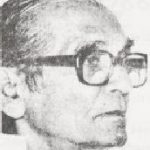
Abburi Varada Rajeswara Rao (1923-1993)
Prominent poet, critic and educator. On the editorial staff of several literary magazines. Taught for some time at Univ. Wisconsin, Madison.
Harikathaa Pitaamaha,
Ajjada Adibhatla Narayana Dasu (1864-1945)
The foremost modern exponent of the literary and performing arts genre “harikatha.” Great musician and scholar of Telugu, Sanskrit and Persian. Principal of Maharaja Music College, Viziyanagaram.
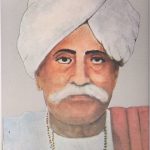

Ajanta -Penumarti Viswanatha Sastry (1922-)
Eminent poet and editor. Made a very big impact on modern Telugu poetry even though he wrote only a few verses in all his life in a highly individualistic tone.
Akkiraju Umakantam (1889-1942)
Eminent scholar of Telugu, Sanskrit, English, etc. Writer. Influenced early Telugu literary criticism.
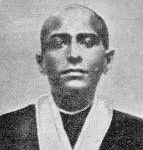

Padakavitaa Pitaamaha, Harikeertanaacharya,
Tallapaka Annamacharya (1408-1503)
One of the greatest composers of South Indian classical tradition. World-class. Wrote more than 32000 compositions known as ‘padam’ as well as other major works. More than 14000 have been discovered to date on copper plate and stone inscriptions. He was the head of an astonishingly brilliant lineage. Seems to have influenced some other great composers of that time, e.g., Purandara Dasa.
Arudra – Bhagavatula Siva Sankara Sastry (1925-1998)
Major modern poet, critic, movie lyricist and literary historian. His “tvamevaaham” and the encyclopedic work on Telugu literature “samagraamdhra saahityam” are very influential.


Bapu – Sattiraju Lakshmi Narayana (1933-)
Eminent painter, cartoonist, movie director, writer, journalist. World class artist. Uniquely personalized style blending to perfection the classical Telugu lines and modern techniques. Had an enormous impact on contemporary Telugu arts, movies, etc.
Bhandaru Achchamamba (1874-1905)
Writer and early pioneer of women’s issues. Published a well known biographical work on prominent national and international women, “abalaa satcharitra ratnamaala” (1901).


Caaso – Chaganti Somayajulu (1915-1993)
Eminent writer of short stories and poetry. Although he wrote sparingly, many of his short stories have been translated into other languages. His indirect contributions include his influence on his friends such as Sri Sri and Narayana Babu. He was a long time president of Progressive Writers Association, arasam.
Chellapilla Venkata Sastry (1870-1950)
Brilliant and highly influential poet in the classical genre. Prolific literary genius. Trained a large number of famous writers. The second of the great duo tirupati venkata kavulu. Honoured as the first poet laureate of Andhra.

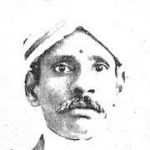
Chilukuri Narayana Rao (1890-1952)
Well-known lexicographer, historian and scholar. Published “aandhra Bhaashaa charitram” (1937) and a revised version of Sankaranarayana’s English-Telugu Dictionary, etc.
Sinaare – C. Narayana Reddy (1931-)
Well-known poet, educator, critic, administrator, and song writer for the movies. For his epic poem visvambhara in modern style the highest literary award in India j~naanapeetha, was given to him in 1987. He also produced several other major works, e.g., karpura vasamta raayalu.
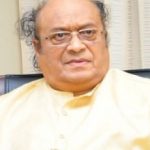

Sir Arthur Cotton (1803-1899)
Perhaps the most beloved western personality in Telugu history. Knighted. One of the finest civil engineers of 19th cent. Built the anicut on Godavari at Dhavaleswaram among other things. His irrigation works and plans transformed the economy of the coastal districts and very strongly influenced its current domineering position.
Charles Philip Brown (1798-1884)
Brilliant scholar of Telugu. Although he was not an Indian, he was intimately connected with Telugu literature for nearly sixty years and immensely contributed to its progress.


Damerla Rama Rao (1897-1925)
Brilliant artist. Became well-known within a very short life span. Founded the Andhra School of Art at Rajamundry. There is an art gallery named after him at Rajamundry today.
Divakarla Tirupati Sastry (1872-1919)
One of the greatest classical poets in the modern era. Excelled in several genres. The first of the famous duo “tirupati vemkata kavulu.”

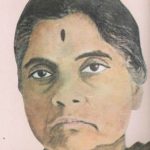
Durgabai Deshmukh (1909-1981)
Eminent freedom fighter, social reformer, educator and leader of early women’s movement
Gora – Goparaju Ramachandra Rao (1902-1975)
Highly influential thinker and social reformer. Dedicated his life to developing atheistic thought in Andhra and beyond. Authored several works. Founded the Atheist Center, Vijayawada. His son lavanam is also a well-known atheist and thinker.


Navayuga Vaitaalikudu,
Gurajada Venkata Appa Rao Pamtulu (1862-1915)
Perhaps the greatest modern writer in Telugu. Commands tremendous respect. Uncompromising intellectual and a social reformer in his own way. More than any one else’s, his works defined the beginning of modern Telugu drama, poetry and short story. The Kanyasulkam drama and much of his poetry are world class. His contributions lay not only in the techniques but also in the refreshing, original and modern outlook and a deep humanistic spirit that he instilled in Telugu literature.
Kasinathuni Nageswara Rao Pamtulu (1868-1937)
Great philanthropist, scholar, editor, journalist and entrepreneur


Mandapaka Parvatriswara Sastry (1833-1897)
Brilliant scholar of Sanskrit and Telugu. Authored 23 Satakas, several maalikas, and kaavyas. Well known for his travelogue yaatraa caritra.
Mangalampalli Balamurali Krishna (1930-)
Brilliant musician in the South Indian classical style. Perhaps the finest from Andhra in his generation. Composer, vocalist, and music scholar.


Mutnuri Krishna Rao (1879-1945)
Great editor and journalist. His Krishna Patrika was instrumental in shaping the Telugu Literary scene for four decades beginning 1907.
Uyyalavada Narasimha Reddy (d. 1847)
Led one of the first popular revolts in all of India against British occupation


Nataraja Ramakrishna (1933-)
Very influential dancer, scholar and writer on Telugu dance forms. Single handedly revived the forgotten art form “aamdhra naatyam.” Although he was born in Bali, his service to Telugu, his ancestral language and its culture is very meritorious.
Oleti Parvatisam (1882-1955)
Pioneering modern writer. The second of the famous duo “vemkata paarvateesvara kavulu.” Authored major kavyas, children’s literature and novels. Produced several translations.


Jaateeya Pataaka Nirmaata,
Pingali Venkayya (1887-1963)
Freedom fighter. Great follower of Mahatma Gandhi. Designed the tricolour -the Indian national flag.
Amara Veerudu,
Potti Sriramulu (1901-1952)
Freedom fighter. Led the popular movement to unite Telugu speaking people under a single government and martyred himself in the process. His act of “Satyagraha” directly led to the eastablishment “Linguistic states” in modern India.


Andhra Kesari,
Tanguturi Prakasam Pamtulu (1872-1957)
One of the greatest freedom fighters of India, eminent leader and administrator. Chief minister of Madras Presidency and the first chief minister of Andhra.
Chandra Rajeswara Rao (1915-1994)
Freedom fighter, eminent socialist, long time general secretary of the communist party of India

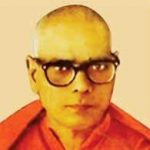
Swami Ramananda Tirtha (?-?)
Freedom fighter. He and other prominent communist and non-communist leaders led the free Telangana movement.
Telamgaanaa Poru Bidda
Ravi Narayana Rao (1908-1991)
Eminent freedom fighter, philanthropist, reformer, and parliamentarian. Spear headed liberation of Telangana movement. Founding member of the communist party of India.

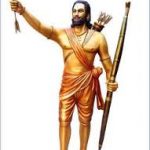
Alluri Sitarama Raju (1897-1924)
Fearless freedom fighter. Led the most famous armed revolt in Telugu history against the British occupation
Kamyunishtu Gandhi,
Puchchalapalli Sundarayya (1913-1985)
Great freedom fighter, social reformer and parliamentarian. Led communist movements in Andhra and beyond for many decades.


Tenneti Viswanatham (1895-1979)
Freedom fighter, parliamentarian, leader and administrator. Close associate of Tanguturi Prakasam.
Naada Brahma,
Kaakarla Tyaaga Raju (1767-1847)
Perhaps the most famous of all the South Indian composers. Part of the great trio of Carnatic music. Great writer. Devotee of Lord Rama. He has a very large lineage of brilliant pupils (Sishya Parampara). Greatly praised and revered as a saint. Hailed as “on whose art no human hand can improve!”

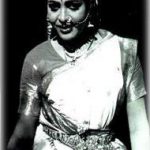
Vedantam Satyanarayana Sarma (1927?-?)
Famous exponent of the Kuchipudi style dance drama. Well-known for his portrayal of female roles, e.g., satya bhaama in bhaamaa kalaapam. Influenced several other artists.
Telugu Chaitanyodyama Saarathi,
Kandukuri Viresalingam Pamtulu (1848-1919)
One of the most brilliant and profoundly influential writers in Telugu. One of the greatest social reformers of 19th century India.
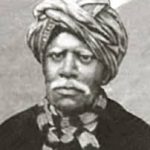

Vecheru Narayana Rao (1932-)
Eminent literary critic and educator. Krishnadevaraya Professor of Languages and Cultures of Asia, Univ. of Wisconsin, Madison. Produced several well-known translations of medieval Telugu poetry in English. Collaborated with many western scholars. His seminal work “telugulo kavitaa viplavaala svarupam” is highly influential.
Vempati China Satyam (1930?-)
Eminent dancer, scholar and dance composer in the Kuchipudi style. Founded the Kuchipudi Art Academy, Madras and a trained several top performers.
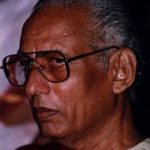
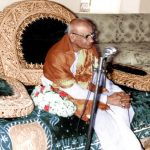
Kavi Samraat,
Visvanatha Satyanarayana (1890-1976)
The greatest classical style writer in modern times. A literary institution all by himself. His work and personality invoked just about every superlative (positive as well as negative) from various critics. Prolific writer and critic. Eminent educator. Significantly contributed to many diverse literary genres . Received India’s highest literary award j~naanapeetha for his raamaayana kalpa vruksham. His novels such as veyi padagalu are equally famous.
Nandamuri Taraka Rama Rao (28 May 1923 – 18 January 1996)
More commonly known as N.T. Rama Rao, NTR, or Anna garu, was a film actor, director, producer and a Chief Minister of Andhra Pradesh. His repertoire of films included mythological, social and folk themes. He was awarded the Padma Sree by the government of India in the 1960s, recognizing his contribution to the Telugu cinema. After his film career, N.T. Ramarao became a political activist and party leader.
He was born in Nimmakuru, Krishna District, Andhra Pradesh. He graduated with a Bachelor of Arts degree from the Andhra-Christian College of Guntur, Andhra Pradesh. He later received an honorary doctorate from Andhra University.


Tripuraneni Ramaswamy Choudary
Tripuraneni Ramaswamy Choudary was — a solicitor by profession, a scholar by choice and a social reformer by requirement. In the 19th Century blind customs and conventions in the name of religion were observed. Social evils like the dowry system and untouchability were widespread. It is surprising that Tripuraneni born in a humble agricultural family, went to study law in Dublin, came back to India and decided to devote his life to reforming age-old, meaningless traditions that have become like cobwebs in men’s brains. While many others of his time were busy making themselves wealthy in the legal profession, Tripuraneni was occupied with the freedom movement against the British and with introducing new thought into his society. His pen became his sword and he wrote a number of literary works to show that old Puranas were misleading men and leading them into intellectual darkness.
Money was being wasted on weddings. He changed the Telugu wedding invitation, which was referred to as Vivaaha patrika (matrimonial document) to a simpler Pendli pilupu (marriage invitation). The marriage mantras and muhurtams were also changed according to the convenience of the bride and bridegroom’s families and marriage vows were made in Telugu rather than in Sanskrit, which noone understood. Such changes were not easily acceptable and in spite of opposition, Tripuraneni was able to establish a system in social festivals and functions, which was followed by the progressive youth of those days. Sacrifice of animals and caste system in the name of religion was also questioned and people were made to realise their mistakes and correct them which they did. His writings contributed to his deeds and the educated who read them were ready to reform themselves. This great man passed away in 1943. A stamp was released on his birth centenary. This year (January 15) marks the 117th year of Tripuraneni Ramaswamy’s birth.
- Taallapaaka Annamayya
- Nannaya, Tikkana & Errana
- Gonabudda Reddy
- Srinathudu
- Bammera Potana
- Sri Krishnadevaraya
- Pingali Soorana
- Gurajada Venkata Appa Rao
- Unnava Lakshminarayana
- Rayaprolu Subba Rao
- Yogi Vemana
- Kandukuri Veeresalingam
- Viswanatha Satyanarayan
- Nori Narasimha Sastry
- Tripuraneni Gopichand
- Kodavatiganti Kutumba Rao
- Srirangam Srinivasarao
- Puttaparthi Narayanacharya
- Baliwada Kantharao
- Vasireddy Seethadevi
- Paravastu Chinnayya Soori
- Madhurantakam Rajaram
- Somanaadhudu Paalkuriki
- Aa thaanu mukkae !!!
- Aada pilla, siggu billa paluvuri lo kanipincha raadhu.
- Aadaboina theerthamu yedurainatlu.
- Aadadaani vayasu magavaani sampaadana adagoddannattu.
- Aadadi saadhinchalenidi ledu, mukhyanga mogudini.
- Aadaleka maddela vodu annatlu.
- Aadavaallaki battathala raademandi?..bettudala ekkuvaganuka. ( Created by Rama Rao Vemulakonda,Secunderabad )
- Aadi lonae hamsa paadhu.
- Aadi tappa raadhu, paliki bonka raadhu.
- Aakaasaaniki hadde ledhu.
- Aakali ruchi yerugadui, Niddura sukham yerugadu, Valapu siggu yerugadu.
- Aakali vaesthe rokali mingamannaadta.
- Aaku yegiri mullu meeda padda, mullu vachi aaku meeda padinaa chirigedi aakae.
- Aalasyam amrutham visham.
- Aalu laedhu, choolu laedhu, koduku paeru somalingam.
- Aarae dheepaaniki velugu yekkuva.
- Aarogyamae mahaabhaagyamu.
- Aasthi mooredu aasa baaredu.
- Aathraagaaniki buddhi mattamu.
- Aavalinthaku anna unnadu kaani, thummuku thammudu laedanta.
- Aavalisthe pegulu lekka pettinatlu..
- Aavu chaenu maestae, dooda gattu maesthundaa?
- Aayane vunte mangali enduku ? (in olden days, women had to shave their heads if their husband dies, so “if he is alive, why need a barber”)
- Abaddhamu aadina athikinatlu undali.
- Abyaasamu koosu vidya.
- Acchigaadi pellilo bucchigaadi ki oka Janjhapu pogu.
- Adaganidhae ammainaa pettadhu.
- Adavari matalaku arthale verule.
- Adavi kaachina vennelalaa (Like light in the jungle – useless).
- Adavilo pelliki Jantuvulae purohitulu.
- Addaalu naadu biddalu kaani, gaddalu naadu kaadhu.
- Addham abaddham cheppadhu.
- Adigae vaadiki cheppaevaadu lokuva.
- Adigo puli ante idigo thoka antaaru.
- Adukkuney vaadiki cheppulu kuttukuney vaadu.
- Adukkunnamma ku 60 kooralata, vandukunna ammaku okate koorata.
- Adusu tokkanela kaalu kadaganela.
- Ae endaku aa godugu.
- Aemi laeni yedaarilo aamudamu chettae mahaa vrukshamu.
- Agadthalo padda pilliki adae vaikuntamu.
- Agniki aajyam posinatlu.
- Agniki vaayuvu thodainatlu.
- Aishwaryamu vastae artha raathri godugu pattamanaevaadu.
- Akka pelli kukka chaavuki vachindi.
- Akulu naakkunae vaadi daggara mootulu naakkunae vaadata.
- Amaayakuniki akshintalu isthae aavalaki velli notlo vesukunnadata.
- Ambali naaketodiki meesaalettetodu okadu.…
- Ambham lo kumbham laa.
- Amma kadupu chustundi, pellam jebu chustundi.
- Andham annam pettadu.
- Andhani mraanipandlaku arrulu chaachuta.
- Andhuni mundu andaalela ? (Why expose beauty before a blind man ?)
- Andithe siga andhaka pothe kaallu.
- Angatlo annee unnaa, alludi notlu seni unnatlu.
- Anna daanam kante vidya daanam goppadi
- Annam parabrahma swaroopam.
- Annapraasana nadae avakaya patchadi.
- Annapu choravae gaani aksharapu chorava laedhu.
- Annee vunna vistharaaku anigimanigi undhata..yemi leni vistaraaku egiregiri paddadata…
- Anni daanamulalo vidya daanam goppadi
- Anni vunna alluni notlo shani vundi annatlu.
- Anthata baave kaani vanga thota kaada kaadhu.
- Antya nishtooram kanna aadhi nishtooram maelu.
- Anumaanam penubhootam.
- Appichchuvadu vaidyudu antaru.
- Appu chaesi pappu koodu.
- Ardharaatri maddeladaruvu.
- Asale ledante pesarapappu vandamannaadata okadu.
- Asalu baabu kanna…guddi baabu melu annattu…
- Asalu kante vaddi ante preeti ata…
- Asaluke esaru pettinatlu.
- Asamarthudiki avakasamivvanela ?(Why give a chance to inefficient person ?)
- Asapothu brahmadu lecipothoo pappu adigaaduta.
- Athi rahasyam batta bayalu.
- Attha leni kodaluttamuraalu, kodalu leni atta gunavanturaalu.
- Attha meeda kopam dutta meeda choopinatlu
- Attha sommu alludu daanam.
- Ayina vaariki aritaakullo……kaani vaariki kanchaalallo.
- Ayithe aadivaaramu, kaakunte somavaaramu.
- Ayya vachhae varaku amaavaasya aaguthundha ?
- Ayyaki leka adukku tintuntae, koduku vachi kodi palaav adigaadata.
- Ayyavaarini cheyyabothae kothi ayyinattlu.
- Baavi lo kappalaa…
- Banthilo balapaksham.
- Bathakalaeni vaadu badi pathulata..
- Bathikuntae balusaaku thinavachhu.
- Bellam chuttu eegalla
- Bellam Kottina Raayila.
- Bhaarya gunavathi satru…
- Bhakthi laeni pooja pathri chaetu.
- Biddochchina vela goddochchina vela.
- Bodi munda ki Mangala Harathi okati.
- Bonkulennae kodala antae – ani anipinchuko attagara.. neeku aaru naaku moodu andata.
- Boodidhalo posina panneeru.
- Chaadasthapu mogudu chebithae vinadu, gillithae yaedusthaadu.
- Chaapa kindha neerula.
- Chaavu kaburu challagaanee cheppali, gabhaluna chebithe avathala vaalla gunde gubhel( Created by Rama Rao Vemulakonda, Secunderabad)
- Chaavu kaburu challa ga cheppinattu.
- Chaavu tappi kannu lotta poyinatlu.
- Chachhinavaani kandlu chaaredu.
- Chachina vaadi pelliki ochindae katnam.
- Chaddi koodu thinnamma mogudaakali yeragadata.
- Chadhuvavaesthae unnamathi poyinadhi.
- Chaduvu raani vaadu vintha pasuvu.
- Chaethakaanammake chaestalu ekkuva.
- Chaethulu kaalinaaka aakulu pattukunnatlu.
- Chakkanamma chikkinaa andame.
- Challa kocchi munta daachinatlu.
- Chanka lo pilladini pettukuni ooranthaa thirigadam…
- Chastunte sandhya mantramannaadata okadu…
- Chedapakuraa, chedaevu.
- Cheekati konnallu, velugu konnallu.
- Chemudaa ante mogudaa annattu.
- Cheppe vadiki vine vaadu lokuva…
- Cheppevannee sriranga neetulu, Doorevannee dommari gudisae lu.
- Cherapakuraa chededhavu, urakakuraa padedhavu.
- Cheruvuki neeti aasa, neetiki cheruvu aasa.
- Chettu peru cheppi kaayalammu kunnatlu
- Chevilo joreega…
- Cheviti vaadi chevilo sankham oodhinatlu.
- Chevitodu pelliki, moogodi Kacheri.
- Chillara devullaku cheruvayithe, asalu devudiki duramouthavu. ( Created by Rama Rao Vemulakonda,Secunderabad )
- Chinna paamunainaa pedda karrato kottaali.
- Chintha chachchinaa pulupu chaava laedhu.
- Chinthakaayalu ammaedhaaniki sirimaanam vasthae, aa vankara tinkaravi yaemi kaayalani adugutundhata.
- Chittam shivuni paina, Bhakti cheppula paina.
- Chiviki chiviki gaalivaana ayinatlu.
- Choosi rammante kaalchi vachchinattu
- Daasuni thappu dandamu tho sari.
- Dabbemanna chettuki kaasthundaa ?
- Dabbivvani vaadu padava mundu yekkaadata
- Dabboo poye seni patte.
- Dabbu lekunda padava mundekkadam.
- Dabbuku lokam daasoham.
- Daevudu varam ichhina poojaari varam ivvadu.
- Dakkinde Dakkudu.
- Dammidi mundaku egaani kshavaram.
- Dampinamma ku bokkinde koolita.
- Danchinammaki bokkindee dakkudu
- Dandam dasa gunam Bhaveth.
- Daridrudi pelliki vadagalla vaana.
- Daya gala (kindness) mogudu thalupu (door) daggaraku vesi kottadata.
- Deepamundagaane illu chakkabettukovaali.
- Demudiki dakshina enduku veyyali ante, vutharam veste velladu ganuka.
- Devudu gudi lone padihilam. Bayataku vasthe padalam(old 1/2kg stone, raayi)(Contributed by Rama Rao Vemulakonda, Secunderabad)
- Deyyalu vedaalu vallinchinatlu.
- Dikku laeni vaadiki daevudae dikku.
- Dina Dina Gandam, Deerghaayishhu.
- Donga chetiki thaalalu itchinatlu.
- Dongaku donga buddhi, doraku dora buddhi.
- Dongaku thaelu kuttinatlu.
- Doorapu kondalu nunupu.
- Dorikithene dongalu, dorakka pothe Doralu.
- Dunnapothu meeda varsham kurisinatlu.
- Duraasa dukhkhamu chetu
- Doorapu kondalu nunupu.
- Dorikithene dongalu, dorakka pothe Doralu.
- Dunnapothu meeda varsham kurisinatlu.
- Duraasa dukhkhamu chetu
- Gaadidha sangeetaaniki vonte aascharyapadithae, vonte andhaaniki gaadidha moorcha poyindata.
- Gaajula baeramu bhojanaananiki sari.
- Gaali lo deepam petti devudaa neede bhraam annattu.
- Gaaliki poye daanini gunduki chuttukunnattlu.
- Ganthaku thagga bontha.
- Gathi laenammaku ganjae paanakamu.
- Goaru chuttu meeda roakali poatu.
- Goda meedha repu(the tommorrow, which will never come).
- Goda meedhi pilli
- Godalaku chevuluntaayi
- Godduni choosi gaddeyyali.
- Gomukha vyaaghram.
- Gonthemma koarikalu.
- Goti tho poyedhaaniki goddali vaadinattu
- Gruddi kanna mella maelu.
- Gruddi yeddhu jonna chaelo padinatlu.
- Gruddu vachhi pillanu vekkirinchinatlu.
- Guddi kannu moosina okate, terichina okate (Refers to anything that is useless. contributed by M S Murthy, Hyderabad)
- Gudi mingae vaadiki nandhi pindimiriyam.
- Gudini, gudilo linganni, minginatlu.
- Gudla meedha kodipetta valae.
- Gumbhanam gunapam laantidi, bayate vaadukovali,kadupulo vunte potlu podustundhi.
- Gummadi kaayala donga antae bhujaalu thadumukonnadata.
- Gundamma London velli kooda Mundala yaaparam pettindata.
- Gurramu gruddi dainaa, daanaalo thakkuva laedhu.
- Guruvuku panganaamaalu pettinatlu.
- Guruvunu minchina sishyudu.
- Inta gelichi rachha geluvu.
- Inta thini, inti vaasaalu lekkhapettinatlu.
- Inti donganu eeshwarudaina pattalaedu.
- Inti paeru kasturivaaru; intilo gabbilaala kampu.
- Intikanna gudi badhramu.
- Intlo chooru kinda neellu taagi, batakochi challa taagamani cheppukuntaaru.
- Intlo eegala mota baita pallaki mota.
- Isthe hiranya daanam, ivvaka pothe kanya daanam (contributed by M S Murthy, Secunderabad)
- Isuka thakkeda paeda thakkeda.
- Jogi-Jogi raajukunte raaledhi boodidhae.
- Juttu vunna amma ye koppi aina pedathadi. (contributed by Bathula Poli Reddy)
- Kottha Pandakki kooda, paatha Mogudenannatlu.
- Kaachina chettukae raalla dhebbalu.
- Kaagala kaaryamu gandharvulae theerchinatlu.
- Kaaki mukkuku dhonda pandu.
- Kaaki pilla kaakiki muddhu.
- Kaakilaa kalakaalam brathikekanna, hamsalaa aaru nelalu bratikithee chaalu
- Kaalam kalisi raaka pothae, karrae paamai kaatu vaesthundhi.
- Kaalikeste medaki, medaki veste kaaliki.
- Kaalu jaarithe theesukogalamu kaani, noru jaarithe theesukogalama!
- Kaashaayam kattina vallandaru sanyasulu karu, kashayam mingina vallandariki kapham karagadu. ( Created by Rama Rao Vemulakonda,Secunderabad )
- Kaasu untae maargamuntadi.
- Kaayaa pandaa?
- Kadha kanchiki cheradam.
- Kadupaa! kallepalli cheruva?
- Kadupu chinchukuntae kaallapai paddatlu.
- Kalakaalapu donga okanaadu dorukunu.
- Kalimi laemulu kaavadi kundalu.
- Kalisi vacchae kaalam vasthae, nadichi vacchae koduku pudathaadu.
- Kalyaanamocchina kakkochinaa aagadannatlu
- Kamaaniki kamaa pettakapothe komaaloki potharu.
- Kanakapu simhaasanamuna sunakamunu koorchundabettuta…
- Kanchae chaenu maesinatlu.
- Kanchu mrogunatlu kanakambu mrogunaa!
- Kandaku laeni dhuradha kaththi peeta kenduku ?
- Kandhaku kaththi peeta lokuva.
- Kandhena vaeyani bandiki kaavaalsinantha sangeetham.
- Karavamantae kappaku kopam, vidavamantae paamuku kopam.
- Karra ichhi pallu ralakottichhu kovatam (contributed by Bathula Poli Reddy)
- Kastae phalae..
- Katte kotte thechche…
- Kayyaniki kaalu duvvadam.
- Keedenchi maelenchamannaru.
- Kodithe enugu kumbhasthalam meeda kottaali.
- Kompa kolleru ayyindi.
- Konabothe koravi ammabothe adavi.
- Konda naalika ku mandesthe unna naalika oodipoyindhata.
- Konda naalikaki mandhu vaesthae, unna naalika oodinatlu.
- Kondaamante korivi….ammudaamante adivi.
- kondallae vacchina aapadha kooda manchuvalae kariginatlu.
- Kondanu thovvi yaelukanu pattinatlu.
- Kondariki thama chinnathanam cheppukovadam chinnathanam, goppavaallayaka chinnathanam
- Konna daggira kosaru gaani, korina dhaggara kosuraa ??
- Koorchuni tinte kondalainaa karugutaayi.
- Koosae gaadidha vachhi maesae gaadhidhanu cherachindhata.
- Koosintha koothurunte annie mancham meedhe koodu.
- Kooti kosam koti vidyalu.
- Kootiki paedhaithae kulaaniki paedhaa ?
- Koppunnamma koti mudulu vestundi.
- Korakaraani koyyalaa.
- Korivi tho thala gokkovadam.
- Korivitho thala gokkunnatlu.
- Kothi pundu brahma raakashasi.
- Kothiki kobbari chippa ichchinatlu.
- Kothiki kobbarikaaya icchinatlu.
- Koththoka vintha-paathoka rotha.
- Koti vidyalu kooti korake.
- Kottha appuku pothe paatha appu bayatapaddadhata.
- Kottha bhicchagaadu poddhu yeragadu.
- Krushito naasti durbhiksham.
- Kshethra merigi vitthanamu, paathra maerigi daanamu.
- Kuche gadidha vacchi mese gadidhanu chedagottindi ata.
- Kudumu chaethikisthae pandaga anaevaadu.
- Kukka kaatuku cheppu dhebba.
- Kukka vasthae raayi dhorakadhu, raayi dhorikithae kukka raadhu.
- Kukshilo aksharam mukk ledu kaanee..
- Kullu pillaki (original is… mundaki) allam pachhadi annattu.
- Kunchamantha kooturuntae annee mancholonae nata.
- Laeni daatha kantae unna lobhi nayam.
- Loguttu perumaallaku eruka.
- Maa taatalu netulu taagaaru, maa mootulu vaasana choodandi annatlu.
- Maatalu choosthe kotalu daatuthaayi.
- Maatalu nerchina kukka usko ante kisko usko andhata.
- Manchamunnantha varaku kaallu chaachukho.
- Manchi vaadu, manchi vaadu ante…manchamekki ganthulesaduta.
- Manchiki pote chededurainatlu.
- Manchimaataku mandhi anthaa manavallae.
- Mandhi yekkuva ayithae majjiga palachana ayinatlu.
- Manduki pampithae maasakaaniki vachaadata.
- Manishi marmamu, maani chaeva bayataku theliyavu.
- Manishi paedha ayithae maataku paedhaa??
- Manishiki maatae alankaram.
- Manishikoka maata-goddukoka dhebba.
- Manishikoka thegulu mahilo vaema annaaru.
- Manishokati thalisthe, deuvudokati thalichaadata.
- Manthraalaku chinthakaayalu raalavu.
- Manthraalu ekkuva. Thumparlu thakkuva.
- Matalu nerchina kukka usko antae usko andita.
- Mee bodi sampaadhanaku iddharu pellaala ?
- Meka vanne puli.
- Merisaedantaa bangaaram kaadhu.
- Meththagaa untae moththa budhdhi ayyindhata.
- Minga metukuledu meesaalaku sampenga noone!
- Modatike mosam
- Modhata bhogi, bhogalekkuvayi rogi, rogaalu bharichaleka yogi. ( Created by Rama Rao Vemulakonda,Secunderabad )
- Mogudni thanni mora pettukundita.
- Mogudu kottinanduku kaadhu, thodi kodalu dheppinanduku (contributed by M S Murthy, Hydearabad)
- Mohamataniki pothe kadupu ayyindata.
- Mokkai vanganidi maanai vangunaa ?
- Mondi vaadu raaju kanna balavanthudu…
- Moola vigrahaniki leka musti eethukuntunte, vusthava vigrahalu vachhi vooregimpu eppudu aanayata.
- Moolige nakka meeda taatikaaya paddatlu.
- Moonnaalla mucchata.
- Morati vaadiki Mogali puvvu isthae madichi mudlo pettukunnadata.
- Morigae kukka karavadhu.
- Mosaevaaniki thelusu kaavadi baruvu.
- Muddi meeda tante mooti pallu raalinattu.
- Mukkattukomantae brahmadi mukku pattukunnadata.
- Mukku meeda kopam.
- Mukkuku sootigaa povadam.
- Mulla kampa meeda padina guddalaa…
- Mullunu mulluthonae theeyaali, vajraanni vajram thonae koyyali.
- Mundaa kaadhu, mutthaidhuvaa kaadhu.
- Mundhara kaallaki bandhaalu vaesinatlu.
- Mundhuku pothe goyyi-venukaku pothe nuyyi.
- Mundu vacchina chevula kante ….venakocchina kommulu vaadi.
- Mundundi musalla pandaga.
- Munjaeti kankanamuku addhamu yendhuku?
- Musalodiki dasaraa pandagannatlu.
- Naaru posina vaadu neeru poyadaa ?
- Nadumanthrapu siri, naraala meedha pundu.
- Naethi beerakaayalo neyyi yentha undho, nee maatalo anthae nijam undhi.
- Nakkaki naagalokaaniki unnantha thaeda.
- Natyam cheyavae rangasaani antae nela vankara andata.
- Navve aadadhanni, yedche magavaadini namma koodadu !
- Navvina naapa chene panduthundi.
- Navvu naalugu vidhaala chaetu.
- Navvulu poyi nuvvulauthayi.
- Nee chevulaku raagi pogulae antae avee neeku laevae annatlu.
- Nee kanti poralu tholaginchi chudu, andari lonu manchine chudagalavu.
- Nee netthi meeda edo undi antae adi edo nee chettonae teeseyyi annadata.
- Nee yedama cheyyi tiyyi naa purra cheyyi pedataanannaadata okadu…
- Neekodi koosthekani thellavarada enti.
- Neeru palla merugu, nizamu demuderugu.
- Nidhaanamae pradhaanam.
- Nijam nilakada meeda telutundi.
- Nijam nippu laantidi.
- Nimmaku neeru yeththinatlu.
- Nindaa munigina vaaniki chali yemiti ?
- Nindu kunda thonakadhu
- Ninnati abadhanni, ivlati nijam tho kappi puchalemu (Created by Rama Rao Vemulakonda)
- Nippu muttanidhi chaeyi kaaladhu.
- Nooru godlu thinna raabandhukaina okatae gaalipettu.
- Nooru gurralaku adhikaari, inta bhaaryaku yendu poori.
- Noru manchidaite….ooru manchidi.
- Nuvvu ekkalsina rail eppudu oka jivithakalam laetu, adhi devudu nee jeevithampai vesina vetu. ( Created by Rama Rao Vemulakonda,Secunderabad )
- Nuvvu mekani kontae, nenu pulini koni nee mekani champisthaa annadata.
- Oda ekke daakaa oda mallanna….oda digina taravaata bodi mallanna annattu
- Oka voralo rendu kaththulu imadavu.
- Okadiki adhrustam kalisi vocchi swargaaniki velthe, rambha muttayi koorchundhi ta.
- Oli (voli- muslims lo iche katnam lantidanukunta) thakkuvani guddidanni pelladadata.
- Onti poota tinnamma orchukuntae, moodu pootalu tinnamma moorcha poyindata.
- Oollo pelliki andaroo peddalae.
- Oollo pelliki kukkala hadavudi.
- Oopiri untae uppu ammukoni brathakavacchu.
- Ooraka raaru mahaanubhaavulu.
- Ooranthaa chuttaalu, uttikatta thaavu laedhu.
- Ooru moham godalu cheputhaayi.
- Ooru pommantundi kaadi rammantundi.
- Oorukunnantha uthamam ledhu, bodi gundantha sukham ledhu.
- Ottu theesi gattuna pettu.
- Paadinde paadaraa paachipalla daasaraa.
- Paaki daanito sarasam kantae attaru saayibu too kalaham maelu.
- Paamu kaallu paamuna keruka.
- Paanakamulo pudaka.
- Paapamani paatha cheera isthae goda chaatuku velli moora vaesindhata.
- Paapi chiraayuvu
- Pachcha kaamerla vachchina vaadiki lokam anthaa pachchagaa kanapadinatlu.
- Paduguraadu maata paadiyay chellu.
- Pakkalo ballem.
- Pancha paandavulu entha mandi ani adigithae – mancham kolla la mugguru ani rendu vellu choopinchaadata.
- Pandavulu sampadhinchina rajyam kaurvula thaddinaanaiki saripoyindhata.
- Panditha putra – parama suntta.
- Pani leni kothi thoka ni teesuku velli mekula madhyalo doorchindata, adi raka kottukuni chivariki chachhindata.
- Panilaeni mangalodu pilli thala gorigadanta.
- Pappulo kaalesinattu…
- Parayi sommu paamu vantidhi.
- Parigeththi paalu taagae kantae nilabadi neellu thaagadam maelu.
- Parula sommu paamu vantidhi.
- Patta pagalu kaakulu kaavu kaavu mantunte mogudini kougalinchukundata.
- Pattindalla bangaaramainatlu.
- Pattipatti panganaamam pedithae goda chaatuku velli cheripi vaesukunnadata.
- Pedhima dhaatithae penna dhaatunu.
- Peenasi vaadi pelliki patchadi metukulu sambhavanata.
- Pelli antae nooraella panta.
- Pelli, Srardhaaniki kooda okatae mantram chadivaadata.
- Pelliki veluthoo pillini chankana pettuku vellinattu.
- Penam meeda nunchi poyyilo paddattu.
- Penuku Pettanamiste Tala anta Korikindata.
- Peraguta taraguta korake.
- Perati chettu vaidyaaniki paniki raadu.
- Perugu thota kooralo perugu yentha undho nee maatalo anthae nijam undhi.
- Phalinche vrukshaanikae raathi debbalu annatlu.
- Picchi koathiki thaelu kuttinatlu.
- Pichhodi chaetulo raayila.
- Pichhuka meedha brahmaastramu.
- Pichivadi chaethilo raayi……
- Pilavani paerantaaniki vellinatlu.
- Pilichi pillani isthanante…kulam thakkuva annaduta… (Modern Version: Pilichi coffee isthanante panchadara thakkuva ayyindi annaduta…)
- Pilli gaddaaniki Japan blade annattu.
- Pilli ki bichcham vaeyadu – (pisinaari).
- Pilli saepaalaku uttlu theghutahaaya?
- Pilliki chelagaatamu, yaelukakau praana sankatamu.
- Pilliki eluka saakshyam.
- Pindi koddhi rotte.
- Pitta konchemu kootha ghanamu.
- Poaru nastamu pondhu laabhamu.
- Poosa guchchinattu cheppadam.
- Poraani chotlaku pothae raaraani maatlu raakapovu.
- Porlinchi porlinchi kottina meesaalaku mannu kaalaedhannadata.
- Poruginti pulla koora ruchi.
- Potta koste aksharam mukka ledu annatlu.
- Potti vaaniki puttedu buddhulu.
- Potugaadu pandiri vesthae pichikalu vachi koola dosaayata.
- Pourusham pullingam, sahanam stree lingam (Contributed by Rama Rao Vemulakonda).
- Pulini choosi nakka vaata pettukunnatlu.
- Pundu meeda kaaram challinatlu.
- Punyam koddhi purushudu, daanam koddhi biddalu.
- Puvvu puttagaane parimalinchunu.
- Raaju gaari divaanamu lo chaakalodi peththanamu.
- Raaju pellaniki musti raatha evadu tappincha galadu ?
- Raajuni choosina kallaki, mogudni chusthe, motthukovalanipinchidhita.
- Raamayanamulo pidakala vaeta.
- Raatha (Nuduti raatha) raalla paalu aithae, mogudu munda paalu ayyadata.
- Raju gari rendava bhaarya manchidi annattu…
- Raju garu thalachu konte debbalaku koduvaa.…
- Rajunu choosina kannulatho …mogudni chooste chulakanale…
- Ramayanam anthaa vini sita ramuduki yaemouthundhi ani adigaadanta.
- Rameshwaram vellina senaeswaram vadhalanatlu.
- Ranku mogudu, bonku pellam.
- Ranku nerchinamma bonku nervada annatlu.
- Ravi kaanchani chota kavi ganchunata…
- Reddi vacchae modhalu aadae.
- Rendu padavala meeda kaalu pettadam.
- Rolu vacchi maddelatho mora pettukundita…
- Rotte virigi naethilo paddatlu.
- Routhu koddhee gurramu.
- Runa saeshamu, sethru saeshamu uncharaadhu.
- Sambarala pellikoduku sapthaashtam lo kooda vasanthaalannadata.
- Samsaram cheddamani saptasamudralalo stnanam cheyaa bote, uppuekkuvai vunnadi kasta vudindi.
- Sangeetaaniki chinthakaayalu raaluthaaya.
- Sankalo pillodini unchukoni oorantha vethikinattu.
- Santhoshamae sagam balam.
- Sarvendriyaanaam nayanam pradhaanam.
- Satram bhojanam matham nidra.
- Seetha kastaalu seethavi, peetha kastaavi peethavi.
- Siggu vidisthae srirangamae.
- Singadu addhanki ponu poyyadu raanu vacchaadu.
- Sivuni aagna laekha cheemaina kuttadhu.
- Sommokadidi sokokadidi
- Subham palakara pellikodaka antae pelli kooturu munda ekkada chachhindi ani adigaadata.
- Swaasa undaevaraku aasa untundhi.
- Tadi guddato gontulu kosinatlu.
- Tammudu tammude, pekaata pekaate!
- Thaa doora kantha ledu medako dolu.
- Thaa chedda kothi vanamaella jherachindhata.
- Thaadi thannu vaani thala thannu vaaru undunu.
- Thaalibottu balamu valla thalambraala varaku bathikaadu.
- Thaanu pattina kundhaeluku moodae kaallu.
- Thaataaku chappullaku kundhaellu bhedhurunaa?
- Thaathaku dhaggulu naerputa.
- Thaeluku paetthanamisthe thellavaarluu kuttindhata.
- Thalli pillala arugudhala(digestion) choosthundhi, thandri pillala perugudhala (growth in education etc.) choosthadu. ( Contributed by Rama Rao Vemulakonda, Secunderabad)
- Thana kopamae thana satruvu.
- Thannu maalina dharmamu-modhalu chedda baeramu.
- Thanthae gaarela buttalo paddatlu.
- Thanu chestey shrungaaram, parulu chestey vyabhichaaram.
- Thanu valachindi Rambha, thanu munigindi Ganga.
- Thappulu vedhikae vaadu thandri oppulu vedikaevaadu vorvalaenivaadu.
- Theega laagithae donka anthaa kadhilinatlu.
- Thegaedhaaka laagavadhdhu.
- Thene poosina katti.
- Thikkalodu thiranaallaku velithae ekka dhiga saripoyindhanta.
- Thinae mundhu ruchi adugaku, vinae mundhu katha adugaku.
- Thinaga thinaga gaarelu chaedu.
- Thindi kosam brathakku, bathakadam kosam thinu.
- Thindiki timmaraaju ….paniki potharaaju.
- Thinte gaarelu thinaali, vinte bhaaratam vinaali.
- Thiyyati thaena nindina notithonae thaenateega kuttaedhi.
- Tikka moguditho teertham velithae teertham antha tippi tippi kottadata.
- Tila papam tala pidikedu.
- Timmini bammini cheyyadam.
- Tinna inti vaasaalu lekkapettinattu
- Tummithe oodipoye mukkulaa.
- Ulli chaesina maelu thalli kooda chaeyadhu.
- Unnadee poyindi, unchukunnadee poyindi.
- Upaayam leni vaadini oollonchi taramaali annatlu.
- Upakaaraaniki poathe apakaaramedurainatlu.
- Urumu urumi mangalam meedha paddatlu.
- Uttikekkalaenamma swargaanikekkuna???
- Vaadae untae vidhavyam enduku, gundu enduku ?
- Vaapunu choosi balamu anukunnadata.
- Vaddinche vaadu manavaadaite, ye pankti lo vunte yem ?
- Vadla ginjalo biyyapu ginja.
- Vandukunna amma kannaa dandu kunna amma goppa. ( Contributed by Rama Rao Vemulakonda, Secunderabad)
- Veepumeedha kottavachhu kaani kadupu meedha kottaraadhu.
- Vennatho pettina vidya.
- Verri veyyi vidhaalu.
- Veyyi abaddhalaadainaa oka pelli cheyyamannatlu.
- Vinaasa kaalae vipareetha budhdhi.
- Vinevaadu verri vengalappa ayithe cheppe vaadu vedhanthi ta.
- Viney vaaduvuntey, aravam (tamil) lo harikadha cheppaadata neelantivaadu.
- Visweswarudiki leka vibhoodi naakuthoo untae, nandeeswarudu vachi ‘naakedi’ ani adigaadata.
- Yae endaku aan godugu.
- Yae gaaliki aa chaapa.
- Yaekulu pedithae buttalu chirugunaa?
- Yeddhu pundu kaakiki muddhu.
- Yegire gaalipathaniki dhaaram aadharam.
- Yekkadaina bhaava kaani vanga thota dhaggara maathramu kaadhu.
- Yekulu mekulayyayata.
- Yeluka tholunu theesi tedaadi ruddina nalupu nalupae kaani thelupu kade…
- Yendaa kaalamlo thirigi thirigi rekkalu padipothunnayi baboo anukundata fan.
- Yenugu bathikinaa veyye, chacchina veyye.
- Yeppudoo aadambaramugaa palikae vaadu alpudu.
- Yevaru teesina gotilo vaarae padataaru.
Telugu Sites
http://www.eenadu.net
http://www.vaartha.com
http://www.andhrabhoomi.net
http://www.andhraprabha.com
http://www.andhrajyothy.com
http://www.teluguone.com
http://www.thatstelugu.com
http://www.telugupeople.com
http://www.idlebrain.com
http://www.andhravision.com
http://www.telugufilmserver.com
http://www.webprapamcham.com
http://www.cinesouth.com
http://www.teluguwebsite.com
http://www.telugutoranam.com
http://www.manatelugu.com
http://www.evaram.com
http://www.santosham.net
http://www.sandhadi.com
http://www.fourshows.com
http://www.chitravanam.com
http://www.telugumata.com
http://www.andhrabharati.com
http://www.teluguworld.org
http://www.telugubhakti.com
http://www.snehabharati.org
http://www.telugujournal.com
Mahabharatam
Temples
Tirumala Tirupathi, AP
Venkateswara Swamy Temple, Chicago,USA
Venkateswara Temple, Pittsburg, USA
Temples in AP
Venkateswara Temple, New Jersey, USA
Venkateswara temple, NSW, Australia
Rama Temple
Hindu Temples
Vishva Hindu Parishad
Lord Venkateswara
Kotappakonda
Dharmapuri Laxminarasimha Swami
Arasavalli Sun God
NRI Telugu Associations
Telugu Association of North America
American Telugu Association
Telugu Literary And Cultural Association
Telugu Association of Malaysia
Japan Telugu Samakhya
Andhra Cultural Association of Ottawa
Arizona Telugu Association
Bay Area Telugu Association
Telugusravanthi
Silicon Andhra
NewZealand Telugu Association Inc
Telugu Association of Australia Inc
Telugu Kalaa Samiti, Kuwait
Telugu association Of North Texas
Sydney Telugu Association Inc.,
Telugu Association Of Greater Boston
Telugu Association Of Greater Kansas
World Telugu Federation (WTF), Chennai
Hi-Tech Telugu Kala Samiti, Kuwait
Colorado Telugu Association
Tri state Telugu Assoc.
San Diego Telugu Assoc. (SANTA)
Pittsburgh Telugu Assoc.[PATA]
Telugu Association of Central Virginia [TACV]
Telugu Assoc. of Australia
Houston Telugu Assoc.
Malaysia Telugu Vedika
Telugu Assoc. Boston
Sydney Telugu Assoc.
Mauritius Andhra Youth
Nebraska Telugu Assoc.
Singapore Telugu Assoc.
Chicago Telugu Assoc.
Chandigarh Telugu Assoc.
Great Washington Assoc.
Greater Delawere Valley.
Southern California Assoc.
Other Telugu Websites
AP Online
AP Tourism
Tourism in AP
Telugu World
Telugu Website
Telugu Links
Telugu Style
Telugu People
Andhra Guide
Andhra Vilas
Andhra Cafe
Andhra Herald
Andhra
Great Andhra
Pramukhandhra
Telugu Naadi
Andhra Helpline
Vizag City Online
Andhravision
Andhra News
Free News Online
Indiapress
Bhopal Andhra Parishad
Telugutanam
Andhra Bharati
Hyd Online
Volam
Vizag Info
Hyderabad Pearl
Sirigina
Full Hyderabad
Kaburlu
Sify Telugu
Sun Network
Kavya-Nandanam
Thatstelugu.oneindia
Telugu Bhakti
